
Projecting new Images
Williamstown’s nonprofit theater is planning to add a second screen and improved seating. Page 2
GILLIAN HECK


Projecting new Images
Williamstown’s nonprofit theater is planning to add a second screen and improved seating. Page 2
GILLIAN HECK

ABOVE: STEPHANIE ZOLLSHAN | BELOW: BEN GARVER — THE BERKSHIRE EAGLE
Above: Employees ring out a rush of customers recently at Theory Wellness in Great Barrington. In Massachusetts, where there are more than 700 establishments selling cannabis, prices are entering a third consecutive year of free-fall. Below: A cannabis flower grows under grow lamps at Berkshire Roots in Pittsfield. Berkshire Roots, Theory Wellness and Canna Provisions all have some level of vertical integration — growing and manufacturing the products they then sell at retail.

Plunging prices and regulatory hurdles a reality check for once-heady industry
By GreG Sukiennik The Berkshire Eagle
When Massachusetts became the first New England state to legalize adult retail cannabis sales in 2016, it set in motion a gold rush.
Border areas such as the Berkshires saw long lines, parking lots full of out-ofstate license plates and a proliferation of entrepreneurs seeking to cash in. Brandon Pollock, CEO of Theory Wellness in Great Barrington, said customers drove to his store from as far away as New Jersey. It seemed like a license to print money.
“We had a lot more demand than supply in the state being the only East Coast
recreational market, and that imbalance of supply and demand led to very, very high pricing,” Pollock said. “When pricing is that high, other investors say, ‘Hey, you know, maybe I should build out one of these grow sites. The pricing is so good.’” But now the price is a fraction of that amount, and New York and every New England state but New Hampshire allows legal recreational sales — meaning border traffic is a much smaller slice of the market.
“Too many people had the same idea at the same time, I guess,” Pollock said, “and now we’re in a situation where we are extremely oversupplied in that product.”
By Sten Spinella
WILLIAMSTOWN
— The last picture show in Northern Berkshire County soon will be able to show a lot more films.
Images leadership has heard from moviegoers that they want more, that as much as they love their community movie theater, the single screen in the auditorium is limiting.
To that end, Images Cinema recently announced it is entering the second part of a $2.2 million fundraising campaign, which will finance the addition of a second screen and new seating.
At the moment, the 150-seat auditorium only sells out for special events, or blockbusters like “Barbie” and “Oppenheimer.”
Images leadership saw that the average peak audience was about 60 to 70.
A preliminary floor plan for the split auditorium calls for a main theater with about 70 seats, and a small theater with 20.
“This will allow us to show more firstrun movies, to bring in new films more often,” said Images Executive Director Dan Hudson. “Right now we have to pick and choose. ... With the two screens, we could also rotate films out sooner because a lot of films are going to streaming faster than they used to post-COVID.”
Hudson noted that around Thanksgiving, Images wanted to carry both “Wicked” and “Moana 2,” but had to delay one. (“Wicked” will be screened at Images soon.)
The first part of the ambitious fundraising effort raised $125,000 for a new lounge, which opened last year and also screens films, albeit to limited seating of 12 to 15 people. The cinema lounge is located in the storefront space immediately adjacent to and contiguous with the Images lobby at 50 Spring St.
Including the funds for the lounge project, Images has raised $1.3 million — leaving about $900,000 needed to complete the campaign. The overall goal is to make Images into the best possible art house/local theater it can be, and to provide a place for people to interact.
“There’s this idea, popular in sociology, of the ‘third place,’” Hudson said. “There’s home, there’s work, then there’s somewhere else that has a meaning where people gather at. In an increasingly secularized society, that’s not necessarily a church or synagogue. Images is a community hub.”
Discussions of a renovation/addition of this magnitude have been ongoing for years, Hudson said, starting before his time with previous executive directors. The former restaurant space that had been adjoining Images, where additional theater space had been before it was chopped in half in the 1980s, was vacant in recent years, in 2018 and 2019, and Images held a pop-up cinema.
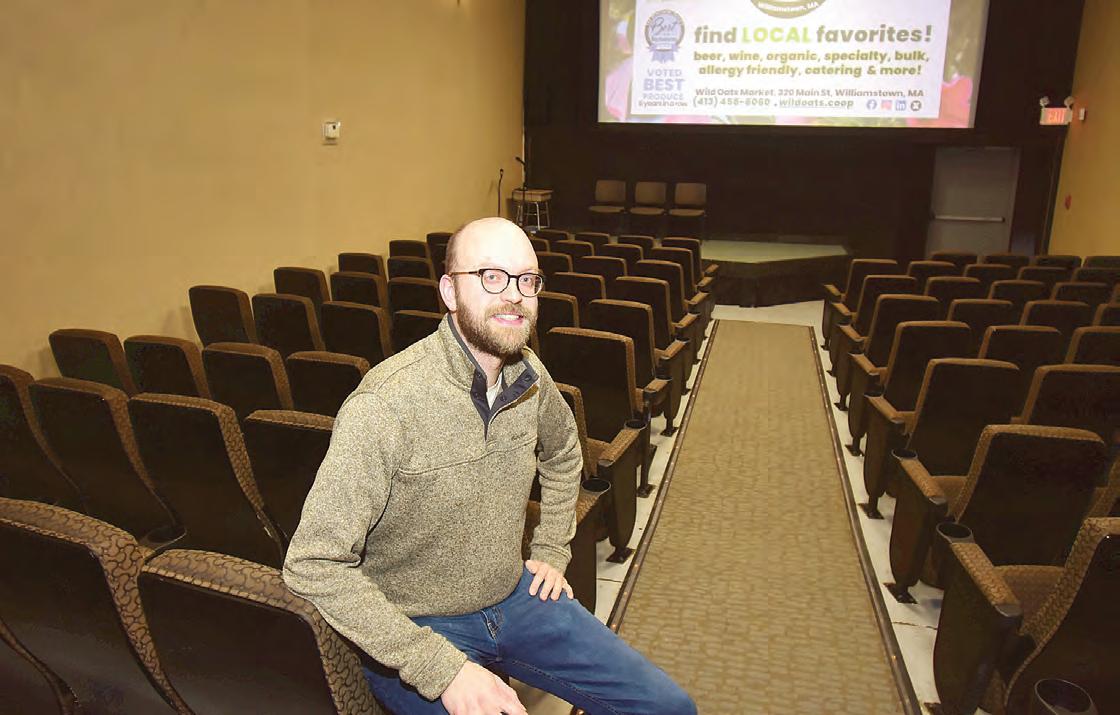
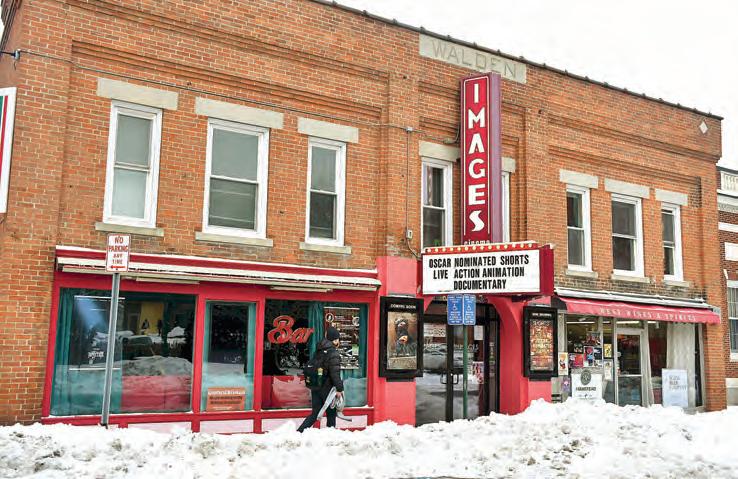
The experience was successful, but while it drove up revenue, it also drove up costs.
“This was even prior to the closure of the Lanesborough and North Adams theaters, back then it showed there was an audience for increased programming,” Hudson said.
Between opening the lounge and planning for the new two-screen setup, Images is well on its way to meeting its fundrais-

ing goal, raising more than $1 million in the past six to seven months alone.
At this point the organization has requests out for state and municipal funding opportunities, as well as grant applications to local foundations. Otherwise, Images is seeking help from the general public to close the gap, with creative recognition opportunities and multiyear pledges.


Though Images is not ready to make its detailed floor plans public, Hudson gave a sense of how the existing theater could accommodate a second screen.
The front two-thirds of the auditorium would be turned into its own theater, with the same screen size, he said.
The floor of the entire theater would be raised, while also making the area ADA accessible with a ramp.
The back three or four rows of the existing auditorium would be expanded and built out at that level to create the second, smaller theater, which would be enclosed with a new soundproof wall. A screen would then be mounted on the south-facing wall.
The construction would require the auditorium to go dark for four to five months, during which time Images will continue to show films in its lounge. It is planning to partner with local groups for film screenings elsewhere during that time.
Hudson anticipates an “historically busy” season at Images this summer before the project begins in earnest.
“With the addition of the lounge, we’re able to host more types of events, gatherings, music, book readings,” he said, “and I’m really excited about the community embracing that kind of culture around the organization.”
By Jim Zarroli
The New York Times
Nicki Wilson was shocked when her local newspaper reported in March 2023 that the Triplex Cinema, an independent four-screen movie house in Great Barrington, was shutting down after almost three decades in business.
The Triplex, the only theater in town, was a much-loved fixture, attracting moviegoers from all around the Berkshires, even on winter nights when not much else was open, Wilson said.
“I couldn’t imagine living in a town without a movie theater,” she said.
Wilson wasn’t the only one who felt this way, and after a communitywide campaign the Triplex reopened in November 2023 in a much different form. No longer is it dependent on ticket and popcorn sales. The Triplex has become a nonprofit organization relying on donations, grants and plenty of volunteer labor. And instead of leaning on the next Hollywood blockbuster, the Triplex focuses on what the community wants to see.
“In an independent theater, you can show what you want,” said Gail Lansky, vice president of the Triplex’s board. “You can show retrospectives. You can show foreign films. You can do film festivals. Free Saturdays for kids.”
Certainly not all nonprofit theaters are doing well, but the model has worked, at least so far, in places like the Berkshires, where a devoted and wellheeled clientele is willing and able to support the arts. Two nearby nonprofit movie theaters in New York, the Moviehouse in Millerton and the Crandell Theater in Chatham, have attracted sizable fan bases. Across the country, more than 250 movie theaters are nonprofits, said Bryan Braunlich, executive director of the Cinema Foundation, a movie-industry group that provides research for cinemas.
“We are definitely seeing a trend of communities rallying around their local theaters,” he said.
And movie theaters have needed saving. Since 2019, the number of screens operating in the United States has declined 12 percent, to 36,369 as of 2023, said David Hancock, chief analyst in media and entertainment at research firm Omdia. The popularity of athome streaming over the past decade was a factor. Before the pandemic, audience numbers were already waning, but COVID-19 nearly dealt the industry a death blow, as consumers got used to staying home and became pickier about what movies they went to a theater to see.
“People certainly came back, but much more slowly,” said the Triplex’s former owner, Richard Stanley. “Ultimately, I saw the handwriting on the wall and decided I had to close.”
When a theater shuts down in town, it’s not just a problem for film buffs. Because of their unique architecture, with sloped floors and few windows, they are hard to convert to other purposes and often leave prominent spaces empty.
Becoming a nonprofit allows theaters to draw on different revenue sources, like film festivals, and the hope is that a theater catering to the people of a town will build a loyal and supportive base.
This doesn’t happen overnight. That was the case with the Belcourt Theater in Nashville, Tenn. A community group had raised millions of dollars to operate and renovate the 1925 movie palace, which briefly served as the main stage of the Grand Ole Opry.
“All of us who work in the theater remember the days when we’d show ‘Badlands’ to four people, and now we show ‘Badlands’ to 150 to 200 people,” said the Belcourt’s executive director, Stephanie Silverman, referring to director Terrence Malick’s debut feature from 1973.
Those who rallied around the Triplex are hoping for the same. When the theater opened in 1995 on the site

BRYAN DERBALLA — THE NEW YORK TIMES
Nicki Wilson, president of the Triplex Cinema’s board, and manager Ben Elliott are shown last December at the theater in Great Barrington. As more local movie houses close, residents in smaller towns are forming nonprofits to buy and operate them.
of a burned-down lumberyard, nearby shopping centers had sucked the life out of Main Street, and Great Barrington was struggling economically, said Stanley, Triplex’s former owner.
Main Street is a very different place today, largely because of an influx of tourists and weekenders, and the Triplex
“was a very pivotal, really core thing that brought people to town,” said Betsy Andrus, executive director of the Southern Berkshire Chamber of Commerce.
By 2023, two other multiplexes in the Berkshires, in Lanesborough and North Adams, had already shut down. But Wilson believed there was hope for the Triplex. She called Stanley to ask if there was some way to reopen the theater.
“I asked what we could do, and he said, ‘Well, pay me $1 million, and you can buy the theater,’” she said.
Wilson didn’t have $1 million to spare, but she did have plenty of friends. In April 2023, she invited her neighbors to her living room to discuss saving the theater. The group, which called itself Save the Triplex, created a GoFundMe page and a website to raise money. The response was overwhelming, said Hannah Wilken, who had spent many weekends at the Triplex with her friends as a teenager and was involved with the fundraising.
Even people who hadn’t been to the theater since before COVID felt a visceral connection to the place. “We just started getting inundated with people saying: ‘I want to help. I want to donate. Sign me up,’” Wilken said.
Actress Karen Allen, who owns a fiber-arts store in town, turned over memorabilia from “Raiders of the Lost Ark,” which she starred in, for an auction. A major boost came when photographer



Gregory Crewdson donated $225,000, after selling copies of a signed limited edition of his work.
Within a few months, the group had raised $246,000 — enough to pay the first year’s mortgage. Stanley liked the idea of keeping the Triplex alive as a nonprofit run by the town’s residents and gave Wilson’s group a five-year mortgage to buy the theater.
The campaign has benefited from the large and devoted Berkshires arts community, which regularly draws celebrities to town. Bill Murray showed up at the Triplex to discuss “The Life Aquatic With Steve Zissou,” the Wes Anderson film in which Murray played the title character, and Joan Baez was there for a showing of a documentary on her life. Arlo Guthrie discussed the 1969 movie “Alice’s Restaurant,” which had been filmed nearby. Not all the events have made money, but enough have done well to keep the Triplex going.
Movie theaters remain a dicey business, and for the Triplex to survive long term it will need a lot more money. The four screening rooms need major renovations. And although an active board oversees the theater’s operations, it had just two full-time paid employees until this month. (A third fulltime employee starts later this month, and the theater also has part-time help, including the people who sell tickets and popcorn.) Wilson, the board’s president, hopes to hire more people,

but for now the theater still depends largely on volunteers.
“The challenges are real,” said Lansky, the board’s vice president. “Everybody knows that an independent theater cannot rely on tickets and concessions alone.”
Nonprofit theaters also tend to be a low priority for film dis-
tributors, Hancock of Omdia said. That means they can’t always show the latest Hollywood blockbuster and must find other ways to keep up audience enthusiasm and a continuing commitment from the community members to donate money and volunteer their time, he said.
“The model can work, but
only if the cinema is valued by the local community,” Hancock added.
Still, those behind the Triplex’s revival believe an audience is out there. Sitting at home and watching movies on Netflix just isn’t the same thing, said Ben Elliott, the creative director at the theater and one of its few
paid staff members. Elliott grew up in Great Barrington and regularly visited the Triplex as a child. One of the things he missed during COVID was the sound of conversations in the lobby after a movie ended.
“Being together in a physical space is something that’s becoming rarer and rarer, and holding

Hart fiber arts supply
moving to larger space
Hart, a fiber arts supply shop and classroom currently located at 16 Railroad St. will celebrate its grand reopening on March 1 at its new location at 34 Railroad St. with free crochet kits to the first 100 customers.
Hart, a locally owned and operated small business, opened in 2021. It offers classes, private instruction, knowledgeable staff, and high-quality fiber arts supplies.
The larger, more accessible space will enable Hart to grow its stock of materials, tools and supplies. Hart’s inventory always has been guided by the community it serves, says owner and Great Barrington resident Jamie Goldenberg. The new space will have a larger sewing and yarn selection including local yarn from Western Mass Fibershed.
With an expanded classroom area and on-site bathroom, Hart will be offering more adult and children’s classes, as well as continuing old favorites, like Saturday knitting and crochet class and a monthly mending night.
Hart offers discount classes for yearround locals working in the hospitality industry.
George Haddad elected to Pittsfield Co-op board
Pittsfield Cooperative Bank has named George Haddad, president of Haddad Auto Group, to its board of directors.
Haddad, a business leader and community advocate, has expanded his company — a family-owned business established in 1933 — to include multiple dealerships across Massachusetts and Vermont, representing brands such as Toyota, Subaru, Hyundai and GMC.
A active member of the community, Haddad also has been a longtime supporter and board member of the Boys & Girls Club of the Berkshires, participating in various committees and organizing the annual golf tournament, which has raised nearly $1 million to date.
Haddad is the 2025 Massachusetts Time Magazine Dealer of the Year, a prestigious honor in the automotive industry, and was among the top five finalists for the 2025 National Time Dealer of the Year award, representing Massachusetts.
Co-op Bank serves the Berkshire community, offering a range of financial services tailored to meet the needs of individuals, families and businesses.
Cain Hibbard is among top women-owned firms
Massachusetts Lawyers Weekly, the leading weekly newspaper for lawyers in Massachusetts, named Cain Hibbard & Myers among the Best Women-Led Law Firms in 2024.
Cain Hibbard, with offices in Pittsfield and Great Barrington, is 66 percent woman-owned, and women hold key leadership roles, including managing partner and President Lucy Prashker.
“The evolution of Cain Hibbard & Myers over its 60-year history from an all male firm to one where women lawyers own a majority interest demonstrates that women can not only be great lawyers, but successful firm leaders,” Prashker said in a prepared release.
Prashker also believes having ownership that’s majority female is a source of pride for all of the firm’s employees.
“Most employees, whatever their gender, feel good about being part of a firm whose leadership embraces and demonstrates diversity.”
Cain Hibbard’s clients include many of the region’s most prominent institutions and businesses, including Berkshire Health Systems, Integritus Healthcare, Austen Riggs Center, Iredale Cosmetics, Guido’s Fresh Marketplace, Berkshire Taconic Community Foundation, and Norman Rockwell Museum.
PITTSFIELD
Hillcrest centers wins Autism Impact Grant
Hillcrest Educational Centers is a recipient of the Autism Community Impact Grant of $15,000 from the Doug Flutie Jr. Foundation for Autism.
The grant is awarded through an application process and historically supports traditionally underserved, underfunded, culturally diverse communities reflected in the Flutie Foundation’s areas of impact.
The Sports Wall purchased with the funds provided by the Doug Flutie Jr. Foundation will serve over 90 students enrolled at Gerard E. Burke Academic Center. Designed to encourage active learning, it offers dynamic, hands-on opportunities that promote engagement, teamwork and sensory-friendly physical activity.
This addition directly supports Hillcrest’s mission to provide compassionate, individualized education to those with unique developmental needs, fostering their growth and independence.
The Honorable Richard A. Simons, the first justice of Berkshire County Probate and Family Court, was recently appointed to the Massachusetts Legal Assistance Corporation’s board of directors.
He inherited the role from the Honorable Chief Justice John D. Casey as the designated appointee of the Trial Court of Massachusetts. As directed by corporation’s charter, the chief justice of the Trial Court or their designee serves on the corporation’s board.
Simons was appointed to the bench by former Gov. Deval Patrick in 2008, bringing over 35 years of experience in family law matters to his role on the board. Simons served as an associate judge before becoming First Justice.
Before joining the bench, Simons was a partner at Simons, Smith & Gerrard P.C. and a hearing member for the Board of Bar Overseers. In addition to his judgeship, Simons serves as chair of the Court’s Education Committee and as a trustee of the Flaschner Judicial Institute.
Simons is passionate about his work serving on the advisory committee for both the J2J Mentor Program and the Changing Lives Through Literature Committee. He holds a bachelor’s degree from Union College and a J.D. from Boston University Law School.
For more information about Simons and the Massachusetts Legal Assistance Corporation, visit mlac.org.
PITTSFIELD
Berkshire United Way’s funding application process is underway, and volunteers will play a vital role in determining to whom the agency will provide general operating support for a two-year funding cycle.
Volunteers commit up to 25 hours training, evaluating individually and meeting with their groups before making recommendations. Final recommendations are made to the Community Impact Committee, followed by board approval and then notifying funding recipients. Funding will begin in mid-July.
The agency will offer three training sessions for volunteer reviewers in March. For more information and to sign up, visit berkshireunitedway.org/ funding-application.
Meanwhile, interested local nonprofits can apply for new funding. Nonprofits are required to meet certain
PITTSFIELD — George Haddad, dealer principal at the Haddad Automotive Group, is among five finalists for the prestigious Time Dealer of the Year Award, a coveted national honor that spotlights the best in the industry.
He was among an elite group of auto dealers handpicked from across the country for their excellence in customer service, business leadership and community involvement.
This recognition highlights his status as a leader in the automotive industry and underscores his significant contributions to elevating industry standards and his community, according to a news release.
The top spot, which was announced during a ceremony in New Orleans last month, went to Ray L. Farabaugh of Evansville, Ind.
Haddad’s journey in the automotive industry is steeped in family legacy and hard work, the release stated.
“From watching my father build a dealership to now owning multiple stores, my career has been fueled by a passion for the industry, dedication to my community and employees, and a commitment to growth and customer service,” Haddad said in prepared remarks.

His early experiences — from selling his first car at age 15 to working in every department of his family’s business —
eligibility criteria and identify impact goals in one of the agency’s updated priority areas: Household stability, school and career readiness and mental health.
The application deadline closes at midnight on March 10. For information on application assistance and to apply, visit the funding application web page, berkshireunitedway.org/funding-application.
PITTSFIELD
Downtown Pittsfield Inc. has officially partnered with Magnetworks, a word-of-mouth hiring tool, to establish the Downtown Pittsfield Inc. Community Job Feed, a local hub designed to connect employers with trusted talent through community referrals, making hiring more personal and effective.
On the Community Job Feed, job seekers, along with friends and family, can browse open roles, share listings within their networks, and earn rewards when their referrals lead to successful hires. Open to everyone in the community, the feed makes sharing opportunities easy while helping friends and neighbors find meaningful work and strengthening local connections.
The Community Job Feed will feature open roles with Downtown Pittsfield Inc. member businesses and organizations exclusively.
Posting open roles on the Community Job Feed is open to Downtown Pittsfield Inc. members who sign on with Magnetworks through an exclusive DPI Member Benefit.
For information and to view the Community Job Feed, visit downtownpittsfield.com/job-feed.

Afreemonthlypublicationby TheBerkshireEagle 75SouthChurchStreet, Pittsfield,MA01201
Visitberkshirebusinessjournal.comfor advertisinginformationandtosubscribe.
NEWSDEPARTMENT 413-447-7311 news@berkshireeagle.com
ADVERTISINGDEPARTMENT AMYFILIAULT,AdvertisingManager 413-496-6322 afiliault@berkshireeagle.com
CHERYLGAJEWSKI,Directorof AdvertisingSales 413-841-6789,413-496-6330 cmcclusky@berkshireeagle.com
have shaped his leadership and commitment to excellence.
In addition to his flagship Toyota dealership in Pittsfield, his portfolio includes Hyundai and Subaru shops in Pittsfield, a GMC dealership in Adams, and a Subaru location in St. Albans, Vt.
Beyond the showroom, Haddad contributes to many community initiatives.
As a longtime board member of the Boys & Girls Club of the Berkshires, he has helped raise substantial funds through annual events such as the club’s golf tournament. He also is involved with local organizations like Soldier On, supporting veterans through charitable donations and community events.
“Nominated by the Massachusetts State Automobile Dealers Association, it is an honor to be recognized among the nation’s top five auto dealers for our efforts both in business and in our community,” Haddad said. “This nomination is a testament to the dedication of my team, our loyal customers, and the enduring support of the communities we serve.”
For more information on Haddad and the Time Dealer of the Year Award, visit tinyurl.com/5ee8tmy2.
ShareyournewswiththeBerkshire BusinessJournal. Ifyouhaveacompany promotion,anewbusinessoranewventure,let theBerkshiresknowaboutit.Rememberthe 5Wsandthatbrieferisbetter.Emailtextand photostoBBJ@newenglandnewspapers.com. ProvideyourexpertiseintheBerkshire BusinessJournal. Doyouhavetheanswer toapersistentquestionaboutbusiness andtheBerkshires?Doyouhaveideasand suggestionsonhowourbusinesscommunity cangrow?Ifyouhaveacommenttomake aboutdoingbusinessintheBerkshiresor ifyou’relookingtoraiseanissuewiththe businesscommunity,thisisthevenuefor that.Wewelcomelettersupto300wordsand commentaryupto600words.Sendtheseto BBJ@newenglandnewspapers.com
BerkshireBusinessJournalispublished monthlybyNewEnglandNewspapersInc., 75S.ChurchSt.,Pittsfield,MA01201. PeriodicalspostagepaidatPittsfield,MA01201. BerkshireBusinessJournalisdeliveredfree tobusinessesinBerkshireCountyviathird classmail.Additionaldistributionismade viadrop-offatselectareanewsstands.The publisherreservestherighttoedit,rejector cancelanyadvertisementatanytime.Only publicationofanadvertisementshallconstitute finalacceptanceofanadvertiser’sorder.All contentsarecopyrightedbyNewEngland NewspapersInc.

designs and merchandise.
By M aryjane Willia Ms
PITTSFIELD — A new creative hub has come to Tyler Street.
Salvo Creative, which started as a custom graphics design shop, has evolved into a collective creative space where customers can build their own brand with the help of an in-house artist.
“If you wanted to come up with your own design, you could come sit with one of our artists here,” said owner Jesse Salvini. “If you have a small business idea, we can help grow from concept to all the way through to your merchandising, and all your advertising, everything.”
The store, located at 288 Tyler St., also offers custom embroidery, commercial to residential signage, protective vinyl coating for cars, vehicle wraps and block printing, with plans to pick up screen printing in the near future.
Salvini said he opened the store to provide a creative space for local artists and entrepreneurs to develop and showcase their talents.
“I’ve always been an artist and liked creating cool new things, and we really didn’t have that space in Berkshire County,” said Salvini. “We want to help grow creativeness.”
The shop also features items from local artists, such as handmade lamps made out of construction site materials.
“We want to showcase stuff like that for artists, because a lot of people aren’t going to be able to see that sitting in their basement or in their living room or on social media,” Salvini said.
Beyond supporting local artists, Salvini aims to give back to the broader community.
Salvini plans to host startup design workshops and a weekend market in the lot next to the shop for local artists and vendors to showcase their work free of charge.
“People driving or walking by will see that and be like, ‘Man, I have these ideas, and that seems like an easy enough thing to do, and they’re offering this for free,’ so

you never know,” said Salvini. “It gets the community involved in that aspect.”
Salvini also wants to offer field trips for students so they can bring their own designs to life as stickers, giving them a hands-on experience of the entire production process.
For more than 20 years, Salvini built motorcycles for a living and traveled with a motorcycle show. That passion for bikes and racing carries Salvo Creative’s commitment to the community to the automotive and racing world.
The shop sponsors a series of racing trucks, targets race graphics and offers sponsorship opportunities to new young racers to help offset costs.
“That’s expensive for parents, so we offer different custom Jersey options for people, stickers that they can sell helps them with the gas money to get to the races and things like that,” Salvini said.
The main design shop is already open for business, with a grand opening planned for May. The vehicle wrap section, located at the back of the store, is set
to open in about a month.
Salvini is eager to support the growth of artists and businesses in Pittsfield by creating distinctive, eye-catching designs that help them stand out.
“The main thing to get people to come to your shops is what you see. We don’t just give you some stock boring look,” said Salvini. “We’ll actually sit with you and design something that fits you and your space and attracts customers into your shop.”
By C larenCe Fant O
LENOX — A mixed-income housing complex at Brushwood Farm is on track for completion in a few months.
The first buildings of the $36 million rental complex, known as Forge, are expected to be ready for occupancy this fall, said Rebecca Schofield of Pennrose, the developer for the project.
The 65 one-, two- and three-bedroom apartments are in 13 townhome-style buildings adjacent to the Courtyard by Marriott hotel on Route 7/20, opposite Lenox Commons. It will also feature a community clubhouse with a fitness center. By September, the entire development will be finished, right on schedule, Schofield said via email. Anyone interested can sign up on the Forge website for updates on when applications for the apartments will be open.
The units will be available at various income levels ranging from 30 to 60 to 120 percent of the area’s median income, as defined by the U.S. Department of Housing and Urban Development.
The 100 percent area median income for Lenox ranges from $78,750 for one person to $90,000 for a couple, $101,250 for a three-person household and $112,500 for a four-person household.
Apartments will have their own entrances at a new road loop laid out to maximize the preservation of the existing wooded environment and tree cover, according to a description on the Pennrose website.
Brushwood Way, the access road to the development, is controlled by a traffic signal on Pittsfield Road that also serves the hotel and Lenox Commons.
Amenities include open-concept floor plans with in-unit washer and dryer, dishwasher and resident-controlled heating and cooling.
“Forge’s location on a major roadway and bus route provides access to town resources and amenities, creating convenient, high-quality housing for Lenox families,” Pennrose stated.
The complex is a mix of affordable and workforce units for low-and middle-income individuals and families.

Pennrose’s mixed-income, workforce housing development at Brushwood Farm in Lenox is nearing completion, with all 13 buildings containing 65 units ready by September, though several should open this spring. The complex is at 36 Pittsfield Road (Route 7/20) adjacent to the Courtyard by Marriott hotel, at left.
Leases are for a minimum of one year and no subletting is permitted, ruling out short-term rentals of the apartments.
Qualified applicants are expected to be chosen by a lottery.
Meanwhile, Pennrose remains committed to pursuing a second mixed-income complex of 68 units about one mile north of Brushwood Farm at 238 Pittsfield Road, Schofield said. The site is currently undeveloped woodland.
The developer is applying for state financing this month, aided by a recent local buy-in of $200,000, plus $100,000 awarded last year, by the Lenox Affordable Housing Trust.
The trust stepped in last week following the Community Preservation Com-
mittee’s decision last month not to award Pennrose its requested $400,000 from taxpayer- and state-supported Community Preservation Act funds.
Committee Chairman Thomas Delasco advocated for waiting to see the Brushwood Farm project up and running to assess its impact on the town.
The committee’s vice chair, Frederick Keator, suggested he would be more open to approving Community Preservation funding for Pennrose’s second project after seeing Brushwood being “wildly successful.” He pointed out Pennrose has been granted $1 million by the committee to support that first development.
“I’m very reluctant to support starting project No. 2 when project No. 1 has not
yet been finished,” he said. “Yes, you’ve done a great job so far. We haven’t seen how this operates and gets populated. I can’t yet approve the second until I’ve seen the first.”
Other committee members echoed Delasco’s and Keator’s viewpoints, leading to a unanimous vote on Jan. 16 to wait and see on the second project.
“We have significant support from the Affordable Housing Trust and community members despite the disappointing CPC decision,” Schofield said on Tuesday. Pennrose is working with the state Department of Transportation on roadway improvements, including a left-turn lane for southbound traffic on the state highway at the second location.
By C laire O’Callahan
LEE — Developers are preparing to seek state funding for the next phase of the multi-use Eagle Mill project, but with communities across the state working to address housing shortages, competition for resources is fierce.
Hoping to add a competitive edge to the project’s application for state funds by demonstrating local support, the Lee Select Board unanimously committed $100,000 to the second phase of the project last week.
“Part of that application process is telling our story and being attractive in a competitive funding round is to have support from the local community,” said Eileen Peltier, CEO of Hearthway.
If the project is selected during this year’s funding round, construction on the 44 new affordable apartments will begin next year with a projected completion date of summer 2027. In the meantime, construction on Phase 1 of the project is set to wrap up this December, with qualifying households able to move into the 56 new units soon after.
“This is a step toward solving our housing problems and a major step toward economic development. It all ties in together,” said Bob Jones, who serves on the Lee Select Board.
Construction at Eagle Mill,

GILLIAN
Construction on phase one of the Eagle Mill project in Lee is set to wrap up this December, with qualifying households able to move into the 56 new units soon after.
once one of 25 paper mills in Lee and one of the last four that operated in town, began in March. The project aims to transform the shuttered mill into a multi-use complex of affordable apartments and commercial space on 8.4 acres along the Housatonic River.
The first phase of the project
encompassed 56 apartments that range in size between one and three-bedrooms. Twenty of the 56 apartments will be rented to households earning up to 80 percent of the area median income, 28 to households earning up to 60 percent AMI and 8 to households earning up to 30 percent AMI.
The second phase of the proj-
ect will also comprise a mix of one, two and three-bedroom apartments. Twenty of the 44 apartments will be rented to people earning up to 80 percent AMI, 16 to households earning up to 60 percent AMI and 8 households earning up to 30 percent AMI.
Phase 2 will also include community spaces, like a mail
room, bike-storage area and laundry room.
Hearthway, which is partnering with Larkin Development on the project, is readying a funding application for that second phase for submission this week.
With much of the state facing a housing availability and affordability crisis, the annual funding round is highly competitive, Peltier said.
“Often it does take two trips to the funding round to get funded. But it’s my job to be eternally optimistic,” Peltier said. “We’re optimistic, but we’ll see.”
To increase their chances of success, Peltier approached the Lee Select Board with a request for local support.
The Select Board, which previously supported Phase 1 with $150,000, unanimously committed another $100,000 to the project on Feb. 18.
That funding doesn’t come from taxpayer dollars, but is rather a density bonus payment the state sends the town for every affordable housing unit built, said Town Administrator Christopher Brittain.
“The expectation is we give a portion of it back to the project to show that we are supporting affordable housing,” Brittain said. If Phase 2 does not receive funding from the state this cycle, Hearthway will reapply the following year, according to Peltier.
By C larenCe Fanto
LENOX — At the crack of dawn on Friday, the grand opening sign was up and the American flag was hoisted as downtown’s first full-service convenience store opened for business.
It was a long time coming; previous owner, the late Glenn K. Hoff, first proposed the conversion 14 years ago.
Sam’s Gulf, the new store, had been long and eagerly awaited by residents and visitors who preferred avoiding a 3 mile drive to north Lenox or to Lee for a fill-up.
The service station offers four pumps, plus three parking spaces.
On sale: Everything from gas, coffee, lottery tickets, beverages, snacks and, yes, newspapers including The Eagle and the New York Post along with other out-of-town titles.
The store is in the overhauled former site of Hoff’s Service Station, owned and operated by Hoff from 1977 until his death in April 2018. The 90 Main St. site closed in July 2021 after 92 years in business, including several owners prior to Hoff.
Co-owner Naeem Haq, a native of Pakistan and a Pittsfield resident for 20 years, said Sam’s is modeled on a similar venture owned by parent company Chucky’s LLC on the East Street auto mile in Pittsfield. Chucky’s is based in Oxford, where it also operates a convenience store.
The Lenox store is open seven days from 6 a.m. to 9 p.m. Regular gas was selling for $2.99 a gallon on Friday, and the Green Mountain Coffee, including dark roast, French vanilla and hazelnut flavors, was free for opening day.
Starting on Saturday, an any-size cup of java will cost $1.59 cash and $1.99 for a credit/debit card or smartphone payment. Cold brew coffee also is available.
“You’ll see, this is guaranteed, our prices are always low for the neighborhood,” said Haq, acknowledging that fuel prices rise and fall based on market conditions. Although Gulf suggests a price, the local owners make the decision, he pointed out.
Among the first morning customers on Friday was longtime Lenox resident Paul Shelhamer. “I’m very glad they’re here. Now I don’t have to burn gas to get gas,” he said. “It’s convenient and the $2.99 price is excellent.”
As a Lenox police officer commented, “Now we won’t have to tell summer visi-
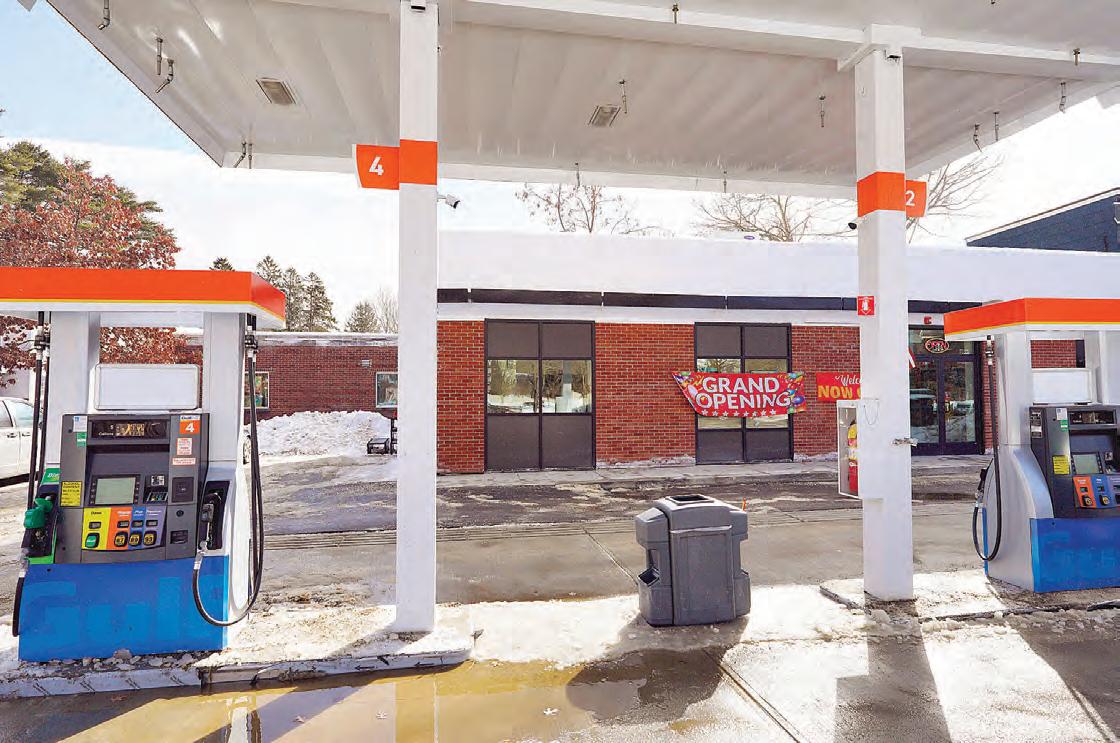
tors where they have to drive to get gas.”
The total cost of launching the business was about $1.5 million, Haq told The Eagle as he greeted first-day customers. The price includes the $300,000 acquisition of the property from Shanlen Realty Corp., the Hoff family’s company, in August 2021.
Haq, the manager, currently employs three staffers, likely to double by summer. He also works in the Pittsfield store.
The Lenox and Pittsfield Sam’s are named after Haq’s nephew, Sam Nadeem.
The Lenox store has chilled beverages, snacks and more. Still to come in about two months: a kitchen for breakfast treats such as doughnuts, lunch sandwiches and Krispy Chicken, a customer favorite at the Pittsfield store.
Haq acknowledged the reconstruction and pre-opening requirements took much
longer than expected once both commenced on the badly deteriorated property in October 2023.
“There were a lot of problems, getting construction going,” he said. But he described the Lenox fire department and the Board of Health as very helpful as inspection approvals were issued recently.
The zoning board approved the project in March 2021, and several months later, the Historic District Commission green lit a site plan ruling out external signage and fluorescent lights on the building in favor of low-impact, downward-facing canopy lights, perimeter lighting and an internal illuminated sign. The commission also approved a specific brick veneer for the exterior.
Now, said Haq, “all we need [is] good appreciation from the customers.”

By C larenCe Fanto
LENOX — Owners of the downtown Garden Gables Inn have won zoning board approval to construct a new building that would add 10 more guest rooms, bringing the inn’s total to 25.
Sullivan Capital LLC, a development company based in Salem, purchased the 135 Main St. property last Nov. 1 for $2,475,000. The inn had been owned in recent years by the Vittori family.
The company’s initial proposal also included an event hall for up to 70 guests, but that was dropped in the face of neighborhood opposition.
At its meeting last month, the Zoning Board of Appeals conditioned its special permit approval of the addition on 24-hour staffing at the inn to conform with a recent town bylaw.
Zoning Board members unanimously approved the new 10-room building for the inn with a revised setback as well as a new curb cut for the new driveway. They also approved the requirement for onsite, in-person management seven days a week. Built in 1780 as a private residence known as the Eliza Williams House, and later as the Butternut Cottage for the butternut trees on its scenic property, the inn and gift shop opened in 1951, according to lenoxhistory.org.

Attorney Lori Robbins of Heller & Robbins told board members that an agreement had been reached with the adjacent neighbors requiring the inn to add a curb cut and second access driveway for sole use of Garden Gables. Until now, the inn has shared one driveway with those neighbors, who will now have sole use of it.
Representing the neighbors, Dan Bross and Rob Cundall, attorney Alexandra Glover told the board that her clients were “very appreciative” of
After the new owners of The Garden Gables Inn in downtown Lenox, seen here last October, scaled back their expansion plans, eliminating an events hall opposed by many neighborhood residents, the town’s zoning board approved a 10-room new building with a requirement for 24-hour on-site, inperson management.
CLARENCE FANTO
their concerns resolved through meetings with Sullivan Capital’s managing partner and construction manager, Niko Giallousis.
A revised parking plan calls for 33 spaces to serve the expanded inn. A landscaping plan also has been added for the inn’s new driveway.
Robbins said the modified application meets zoning bylaws requiring that the expansion is “not more detrimental to the neighborhood” than the existing inn.
ZBA member Donna Pignatelli praised the inn’s new owners for “coming a long way” from the widespread initial opposition focused on the originally proposed event hall, and offered support for the current expansion plan limited to the new building.
“This has been a tough one for me,” said longtime ZBA member Shawn Leary Considine.
Noting that the inn is surrounded by residential properties, she complimented Sullivan Capital for working with the direct abutters “and giving them the privacy they deserve as residents right next to this commercial operation.” She also cited the withdrawal of the event hall as a plus, but insisted on the 24hour on-site staffing at the inn.
“When all is said and done, we’re still a town, still a neighborhood and we always encourage people to talk things over and to work things out,” said ZBA Chairman Robert Fuster Jr. “When you look at the big picture, it is not a substantially detrimental increase.”
Addressing the inn owners, ZBA member Kimberly Duval commented that “through trial and fire, you guys have become part of Lenox and good neighbors. Even though it took months to get here and some tough conversations, the end result is so much better and overall the project fits in with the neighborhood.”

By Anthony DuvAl, Sponsored Content Editor
When it comes to banking, no two clients are exactly alike. Their needs, challenges and aspirations vary, but one thing should remain constant: the approach.
For Pittsfield Cooperative Bank (Co-op Bank), that community approach has been rooted in honesty, expertise and a deep commitment to reinvesting in the region for 136 years. Today, the bank is building upon its legacy of exceptional service, bringing renewed energy and opportunities to the people and businesses of the Berkshires.
BANKING ON REAL ADVICE, NOT JUST PAPERWORK
At Pittsfield Co-op, banking is all about relationships. That means taking the time to understand each customer’s situation and helping them find the right financial options. Whether it’s opening a savings account, buying a car or managing money online, Pittsfield Co-op keeps banking straightforward and accessible.
And when big financial decisions come up — buying a home or expanding a business — their team is ready and eager to help. And when challenges arise, they don’t disappear. “As bankers, our job is to be there through every stage — the good times, the tough times and everything in between,” said Pittsfield Co-op CEO Michael Daly.
That kind of flexibility makes a difference, especially for businesses. Growth, unexpected expenses and new opportunities don’t wait around for slow decision-making. Some months bring steady profits, while others mean dealing with setbacks.
Pittsfield Co-op’s business line of credit gives businesses a financial cushion — money that is available when they need it, with no cash advance fees and no interest until it’s used. And for smaller businesses need-
ing extra backing, Pittsfield Co-op offers loans with partial guarantees from the Small Business Administration (SBA), a federal program designed to help businesses expand.
Real estate is another area where a one-size-fits-all approach doesn’t work. Whether buying, building or refinancing, every project comes with distinctive challenges. That’s why Pittsfield Co-op’s lending team takes the time to listen and help structure financing in a way that makes sense. With deep roots in the Berkshires, they know the market well, so businesses get practical advice, not just paperwork.
For real estate investors, Pittsfield Co-op offers flexible financing for rental properties, mixed-use buildings as well as commerical spaces. Because they are familiar with the local market, they can tailor loans that work for both shortterm projects and long-term investments.
And unlike big institutions with layers of bureaucracy, Pittsfield Co-op is able to do all of this with none of the red tape. “Approvals and closings can get complicated,” said Sierra Watson, VP of Commercial Lending. “Because we make decisions locally, we can move faster and structure deals that actually work for our clients and not just fit them into a predefined box.”
This focus on people has

helped Pittsfield Co-op bridge the needs gap between large borrowers and small businesses that are the backbone of the Berkshire community, and this has resulted in relationships that last for decades.
Bankers often cross paths with customers they helped years ago, business owners who started small and are now leaders in the local economy. “A business owner recently called me, reminding me of advice I gave them 35 years ago,” Daly shared. “At the time, they were struggling, and I had to be honest with them. Decades later, they told me, ‘I’m glad I listened to you.’ That’s what this kind of banking is about.”
The strength of any bank lies in its people, and Pittsfield Co-op is committed to investing in its team through mentorship, professional development, accessibility and transparency, and thoughtful recruitment.
Here, collaboration is able to happen both vertically, from leadership to frontline employees, and horizontally across divisions, whether it’s retail, mortgage or commercial.
“We have an open canvas for growth,” said Mike Ferry, who was recently recruited out of retirement to build out the Commercial department. “Our team
brings together deep knowledge, strong relationships in this market and a passion for customer service. That not only benefits our clients, but creates an environment where everyone supports each other every step of the way.”
That philosophy — blending diverse backgrounds and experience — is already proving invaluable. Beginning with the recent hiring of Michael Daly as CEO, well-known and respected individuals like Mike Ferry, Lisa Trybus, and LouAnn Harvey, have joined the team, bringing decades of knowledge, relationships and expertise to Co-op Bank. Ferry alone brings over 40 years of banking knowledge, 35 of those years managing complex commercial deals for Berkshire Bank.
Behind the scenes, Renee Kozakis, Commercial Loan Administrative Assistant, keeps everything running, drawing on her 35 years of regional banking experience to manage loan servicing and account operations. On the credit side, Vice President and Senior Credit Officer Lisa Lawler, who specializes in underwriting and risk analysis, draws on more than 30 years of corporate finance experience to ensure loans are structured soundly. Together, they provide essential support that allows the team to stay focused on helping local business-
“We’ve always been about relationships, about being there through the ups and downs. That won’t change. What will change is our visibility. More people will see what we’re doing, more businesses will turn to us and more clients will experience firsthand what makes Pittsfield Co-op unique.”
Michael Daly, CEO
es flourish.
For many team members like Patrick Morrison, working with people from a broad range of backgrounds has provided him with the mentorship and support necessary to excel in his role. Morrison originally started as a teller. Five years later, he’s a Junior Credit Analyst and, with the bank’s support, has completed training through the Risk Management Association and Massachusetts Bankers Association.
Alongside unique skills and experience, many employees have fostered deep, longstanding relationships throughout their career journey not just through banking, but through work in volunteering, municipal boards and even family businesses.
Sierra Watson and Zachary Gundler, for example, both started their financial careers helping their families run small businesses, acquiring firsthand experience in what it takes for businesses to thrive. “From a young age, my parents taught me financial fundamentals. That foundation helped me appreciate the commercial side of banking and continues to help me guide businesses toward success,” said Watson.
With a solid foundation, a talented team and a clear vision for growth, the future looks bright for Pittsfield Co-op — and for the businesses and individuals it serves.
“We’ve always been about relationships, about being there through the ups and downs,” Michael Daly reflected. “That won’t change. What will change is our visibility. More people will see what we’re doing, more businesses will turn to us and more clients will experience firsthand what makes Pittsfield Co-op unique.”
In Massachusetts, where there are more than 700 establishments selling cannabis — one for every 10,000 residents — prices are entering a third consecutive year of free-fall, with the average cost per gram of flower declining nearly 65 percent since January 2022. The same flower that was on average worth $12.64 per gram in January 2022 was worth $4.43 per gram two months ago, according to the state Cannabis Control Commission.
That’s had an impact on the Berkshires’ cannabis industry — which, since legalization, has reported $556.1 million in gross sales, according to the CCC.
In the past year, Temescal Wellness’ grow operation in North Adams has closed, in part because it could not compete with plunging wholesale prices. Last month, Bloom Brothers in Pittsfield announced it would be laying off staff — a step its owners said they never wanted to take.
“I think everybody’s having a pretty tough time out there,” Pollock said. “Cultivation is affected, perhaps worse, because if you’re trying to be a cultivation business, and those prices go down, there’s very little margin of error.”
‘RACE TO THE BOTTOM’
Several local industry leaders used the phrase “race to the bottom” to describe the current pricing dynamic. But that’s happening in a market where owners must also pay significant costs for labor and meeting state mandates. Because cannabis remains a Schedule I substance under federal drug laws, entrepreneurs can’t deduct business expenses like every other retailer.
“The mentality is everyone thinks price is everything and nothing else matters, and that’s a slippery slope,” says Meg Sanders of Canna Provisions in Lee. “If you’re competing on price, that’s pretty much a death spiral. At some point it doesn’t mater how cheap it is, you won’t be able to pay your bills. Fixed expenses like rent, the mortgage, electricity —
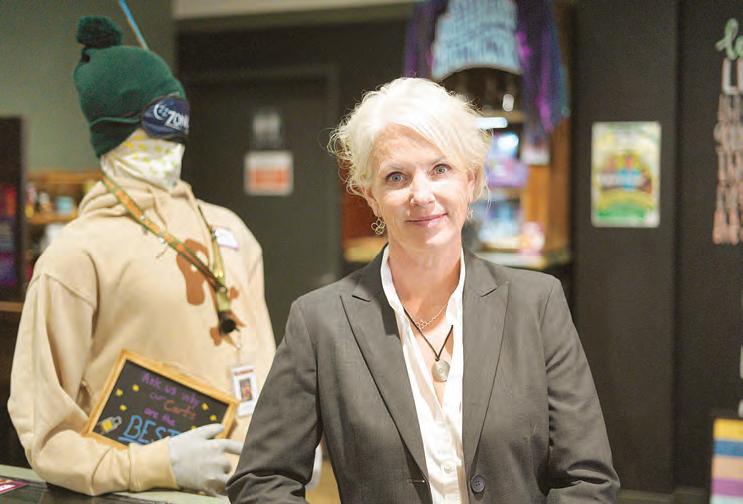
“The mentality is everyone thinks price is everything and nothing else matters, and that’s a slippery slope.”
Meg SanderS, Canna Provisions CEO
these are non-negotiables.”
Theory Wellness, Canna Provisions and Berkshire Roots all have some level of vertical integration — growing and manufacturing the products they then sell at retail. (For another example, think of Stewart’s Stores in New York and Vermont, which makes the plastic bottles in which its milk and soft drinks are sold.)
But vertical integration only offers so much protection, Sanders and Pollock both said — not when customers care more about what’s on the shelf and less about whether you grew it.
“As the industry matures in the market, customers want variety. They want all kinds of different products, different






price points, different strains, different flavors,” Sanders said. “We’ve seen company after company come out of the gate in multiple states thinking, ‘I’m only going to sell my products, and that’s how I’m going to win.’ And ultimately they have to change that strategy, because customers want more and they’re becoming very brand loyal.”
‘A
While high supply and lower demand might mean cheaper prices for customers, the cost to businesses is steep, said Andrea F. Nuciforo Jr., an attorney serving as general counsel to Pittsfield-based Berkshire Roots.
The price decrease “means a product a retailer was selling for $50 might be selling for $17.95 today. An environment like that brings a lot of challenges for anybody,” Nuciforo said.
With that in mind, it’s not rocket science to predict what the state’s cannabis glut will eventually mean.
“This is not a one-off. This is happening throughout Massachusetts,” Nuciforo said of Bloom Brothers’ layoffs. “You don’t have to be Warren Buffett to know if you increase supply, demand goes down. That’s what’s happened.”
While cheaper products are a boon to consumers, the state’s cannabis glut will eventually correct itself. And there’s no pain-free way out of that, Pollock said.
“It’s very unfortunate, but we have seen, already, over the last few months, several larger businesses closed. More will close,” Pollock said. “Unfortunately, this year is going to be a year of hard decisions for a lot of our colleagues. The only way that supply and demand balance out over time is for them to literally balance out, which is going to require a reduction in the supply.”
The past year has seen at least two Berkshire cannabis operations affected by market conditions.
Bloom Brothers, the business Nathan Girard owns with his wife, Migdeliz, and brothers Ben and Nick, had committed to never laying off employees when it first opened its Larch Street shop in 2020, according to a LinkedIn post Nathan Girard posted in February. He declined to elaborate on how many jobs would be lost or what percentage of the workforce.
Temescal Wellness invested $20 million in the former Crane Stationery building in North Adams for a high-tech grow operation and initial hopes of creating 80 jobs. But a costly error — 1,630 defective grow lights, made in China and purchased from a Colorado company for $1,000 each, according to CEO Edward T. Rebholz Sr. –reduced the operation’s efficiency and led to unanticipated power costs.
That would have been bad enough if the wholesale price for flower wasn’t $1.50 per gram.




BEN GARVER
Cannabis flower sold for an average $12.64 per gram in January 2022, according to the state Cannabis Control Commission. The same amount was worth $4.43 per gram two months ago.
FROM PAGE 10
But the facility’s production cost was $3 per gram, making it all but impossible to turn things around. The only option, Rebholz Sr., told the Eagle last year, was closure — “a drastic measure I had to take for the survival of the rest of the company.” (Temescal’s retail outlet in Pittsfield remains open.)
Statewide, 30 license-holders closed operations in 2024, according to the CCC. Sanders, who is also a consultant to cannabis businesses, said controlling costs and smartly managing inventory are critical. Some businesses manage inventory 90 days out; Sanders said Canna Provisions cut that back to 14 days ahead.
Selling “the cheapest weed possible” is not the way out, she warned.
“They may have a bunch of people going in and buying a $4 pre roll, but that’s not going to keep the lights on, period. It’s not going to cover your payroll. It just isn’t. And I think that there’s a lot of people thinking that you can volume your pay out of price compression — ‘Well, if our price drops 75 percent we just need to get a whole bunch more customers in the door, right?’ That equation never works.”
What value proposition does work? Customer experience that grows loyal clientele, Sanders said.
“[Feb. 28] was the economic blackout, right? And we had one of our best Fridays that we’ve had in a long, long time. So it just goes to show that people are shopping local,” she said. “Consumers are supporting new businesses that they believe in by voting with their dollars, and we’re super grateful for that, and we don’t take it for granted.”
REGULATORY RELIEF
Pollock is among industry leaders hoping the Legislature can provide a measure of regulatory relief by reducing costs. He pointed to a pair of bills supported by the Massachusetts Cannabis Coalition,
an industry group,
State law also requires that employees carry a badge for every license they’re working with, at a cost of $115 per badge.
Pollock has 10 badges; Sanders has five. A proposal before the Legislature would eliminate that requirement.
“It’s a small ticket item, but I’d love to have an additional $7,000 not going to badging,” Sanders said.
The coalition is also backing legislation that would increase the amount of cannabis a person could possess or purchase from the current limit of 1 gram to as much as 3 grams.
Acting CCC board Chair Bruce Stebbins acknowledged that some license-holders are facing financial difficulty for many reasons. The commission is working to respond to those concerns, he said, noting regulatory changes made last year to help delivery operators, microbusinesses and medical patients.
“So far this year, we’ve begun by tackling cultivation tier relegation, badging, and moved to intervene in lawsuits between host communities and licensees,” he said. “I believe there are opportunities to modernize our existing regulations.”
Pollock agreed with that assessment.
“I think purchase limits is something that could be inserted in the budget in April and would provide immediate additional tax revenue to the state,” Pollock said. “So we think that’s a real sort of common sense reform that we’re we’re hopeful will get included.”
Sanders would also like to see tighter regulation of rules that are supposed to prevent vape shops and corner stores from selling hemp-derived products containing THC, the active ingredient in cannabis.
“You can walk into any vape store and see what delta nine, delta eight and THC products they have on their menus. I think you’ll be pretty surprised that there’s quite a few,” Sanders said. “So I’m competing, not only in the highly regulated market with my peers, but I’m also competing with the vape stores down the street.”




By Sten Spinella
NORTH ADAMS — Chef and businessman Matt Tatro has completed the sale of Trés Niños Taqueria, clearing the way for him to focus on the move of his other restaurant, Grazie, to a new downtown location.
Tatro has been looking sell the Trés Niños to someone who would keep it mostly as is; and that’s exactly what the new buyer — Duncan Russell, owner of Christo’s Famous Pizza — has in mind.
“Matt’s done a great job with Trés,” said Russell, who plans to take over the restaurant next month. “It’s a sustainable business, and something that should remain within the community.”
Russell has owned Christo’s since 2021.
Though Tatro was seeking about $59,000, he settled for a price less than $50,000.
“It was very fair on both ends. All the equipment came with it, so there’s a lot of tangible assets,” Tatro said Tuesday. “I made a big concession given that I wanted the concept to remain. I was confident that another owner could make that happen if they remained status quo while giving it a little facelift of their own.”
Tatro, who opened Trés Niños in 2019, said trying to balance two restaurants and his family has been too much of a burden.
“I’m thankful that it’s going to remain Trés Niños,” he said, “because that’s a concept North Adams needs.”
BIG MOVE
Meanwhile, Tatro has been working to find a new location for the popular Grazie. Late last month, he closed on a new location at 310 State St., where he hopes to reopen Grazie, possibly as soon as April.
Tatro bought the State Street building, most recently an event space called The Venue, for $375,000, from Tom Rumbolt and Jason Nocher.
In the interim, Grazie will remain open at its current location on Marshall Street.
He said he hope’s to minimize the time that employees go without work, but that there would be one or two weeks of transition time where Grazie will have to stop serving.
“We’re spending a lot of money to buy and purchase and update equipment and plates and silverware and theme-specific items for the new restaurant, so it’s costly,” Tatro said. “We need the revenue stream to keep coming in to be able to support that.”
On Tuesday, Grazie sought a change of location for its liquor license from the city License Commission.
For those sentimental about the Marshall Street location, Grazie is, too.


“We certainly appreciate our customers who are helping us finish out our tenure on Mar-
shall Street,”
said. “Relishing our last days there is very meaningful to us.”

Below, Tatro closed on a new location at 310 State St. for his restaurant Grazie, which will be moving from its current address on Marshall Street. The State Street restaurant could open in April, at the earliest.


By GreG Sukiennik
ADAMS — Like lots of Northern Berkshire folks, Emily Moulton has happy memories of going to The Rainbow Shack for ice cream — or, when she was a student at St. Stanislaus Kostka School, the ice cream coming to her and her classmates at the start of a new school year.
“Every September we’d get sent the shop’s leftover cartons of ice cream,” she recalled.
“You’d hope you didn’t get pistachio ... now, I’d love to get the pistachio.”
Emily Moulton, her fiancée, Kyle Danforth, and her father, Mark P. Moulton, are the new owners of the venerable ice cream parlor on Summer Street. They intend to maintain and improve what people love about the place, freshening up and modernizing the operation as they go. They’re hoping to reopen the seasonal business in April, just as it has every year.
“I love the potential it has,”
Emily Moulton said. “I love making people happy and people love eating good sweet treats. It doesn’t get better than that.”
David and Paula Randall sold the business, its home at 85 Summer St. and its prized mocha sundae recipe for $215,000 to Danmark LLC, according to records filed with the Berkshire North Registry of Deeds on Feb. 13. The business and property had been for sale for a year and were listed by Colleen Zajac of Monarch Realty.
Emily Moulton, one of the three listed managers for Danmark LLC, posted the news on the Rainbow Shack’s Facebook page. Mark Moulton and Danforth are the other managers listed for Danmark LLC, according to business listings on the Secretary of State’s website.
“We recently changed ownership and we are really excited for what is to come! We know how important The Rainbow Shack is to our community and the importance of a good hurricane or slush float. Our goal is to create a new and welcoming environment, while keeping what makes The Rainbow Shack, The Rainbow Shack,” she said in the post.
Customers and supporters responded to the post with more than 500 likes and 121 comments, offering congratulations, support, memories and no small amount of affection for the mocha sundae. That recipe traces its lineage back to the former McKinley Drug
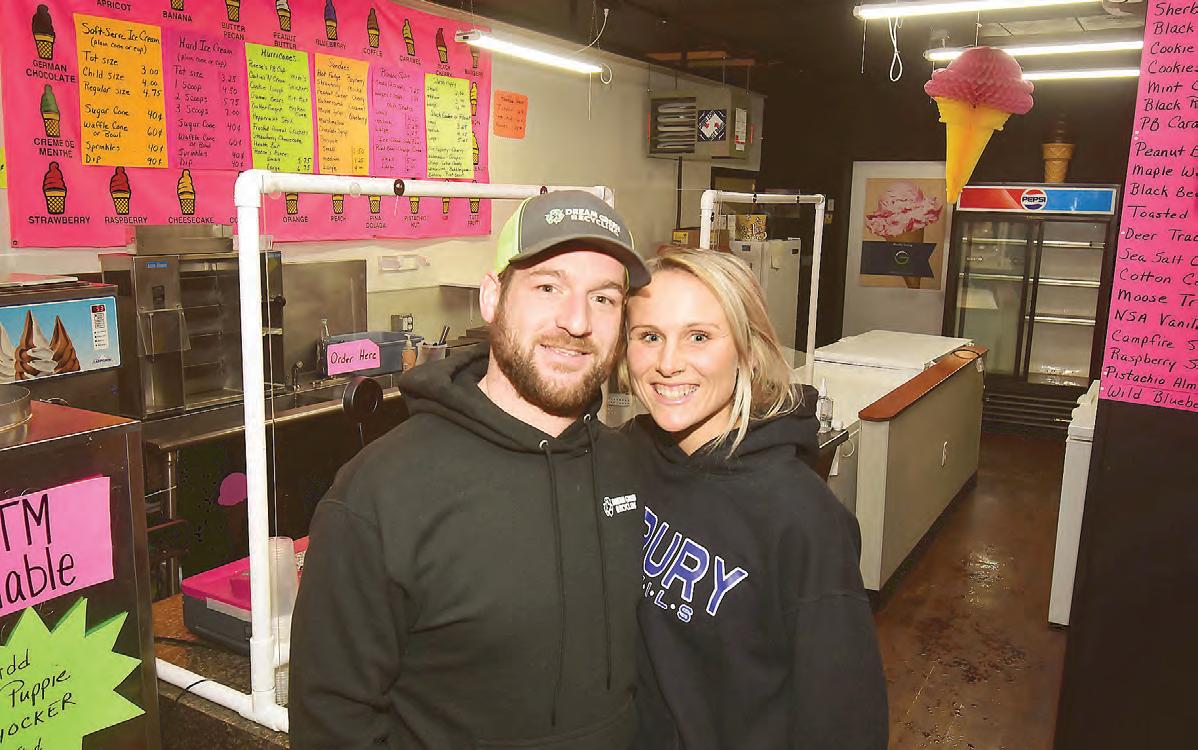
Store on Park Street.
“It’s amazing to see how open the Adams community is and how much ice cream means to people,” Emily Moulton said. What comes through in those conversations is “the memories you make eating the ice cream … which I think is important,” she said.
“Honestly, it still feels dreamy to me. It hasn’t fully sunk in,” she said of closing on the sale. “Now that I’m walking out in public and getting responses, it feels more real.”
The Randalls started the business on Hoosac Street in 1996 and purchased the 85 Summer St. location in 2012.
Emily Moulton remembers the original location; it was adjacent to the grounds where the school held its annual field day in June, and during that end-ofyear event, students were welcome to walk over and order whatever they wanted.
“In high school, I’d go after every softball practice. Then I went to MCLA … so I introduced my college friends to a good old hurricane,” said Emily Moulton, now a special education teacher at Drury High School. “So it’s been a staple …

we’re big ice cream people.”
As time goes on, Emily Moulton says they’ll try adding a few new elements, such as coffee or baked goods. “We can add some things and see if they work, and
if they don’t work, we’ll go from there,” she said.
As a teacher and girls’ basketball coach at Drury, Emily Moulton has her summers free. But she has already lined up help to
run the shop, so she can keep the teaching job she loves.
“We have people willing to step in and take on a managerial role once we get the ball rolling, which is amazing,” she said.

By Sten Spinella
WILLIAMSTOWN — Maestri’s Munchies, the cannabis-themed doughnut shop, is undergoing a transition.
But there will still be tasty treats to be had, but under new ownership — and sans the weed theme.
Owner Logan Maestri will stay on as minority owner. The new majority owner, whom Maestri declined to name, will be able to give the shop the money it needs to expand offerings and hire staff.
“It’ll be the same doughnuts everybody loves, but new faces, a new name, a new sign, and somebody with new motivation,” Maestri said. “It’s doing well enough, but ultimately, for it to be successful, it needs to evolve.”
Maestri’s Munchies, at 230 Main St., opened in 2023 on 4/20 — a high holiday for cannabis aficionados. Maestri, a Marine veteran and 16-year Berkshire resident, spent at least three years planning the shop and executing his vision.
FRIDGE ANGEL
The story of how Maestri came to sell the business involves an act of kindness on the part of the eventual mystery buyer.
In the process of opening the establishment, Maestri says he overextended himself financially. He had to let go of his staff, and has been operating the store recently with his mother, Alicia Maestri.
On a day where Maestri was looking for any reason to move

PHOTOS BY GILLIAN HECK

“It’ll be the same doughnuts everybody loves, but new faces, a new name, a new sign, and somebody with new motivation,” Logan Maestri said. “It’s doing well enough, but ultimately, for it to be successful, it needs to evolve.”
afford — and will likely offer bagels and muffins among other breakfast options.
Maestri acknowledged that the homage to marijuana may have been abrasive or even confusing to some. It was only ever a play on selling “munchies” directly next to Williamstown’s cannabis dispensary, Silver Therapeutics.
on from the business, he came in to find an expensive, double-door refrigerator had broken. It would cost $4,000 to repair and $5,000 to $6,000 to replace. Alicia Maestri told a customer later that day what had happened, and said this may be the last batch from Maestri’s Munchies.
The customer brought the doughnuts to a friend, who remarked about it being the best doughnut they’ve ever had.
Upon learning Maestri’s may be closing, the friend immediately went out and bought a new fridge for the shop, saying, “No business should have to close because of a piece of equipment.”
Only partially out of guilt, Maestri stayed open a few months more before telling the “fridge angel,” as Maestri’s phone contact labels them, that it wasn’t financially viable to stay open. He wanted to know what he
should do with the fridge.
“They started probing me about the business,” Maestri said of his benefactor. “That’s the guy who’s stepping in and taking over.”
The new owner may go more for a Berkshire theme this time around. The business will have an oven — something Maestri had wanted, but was unable to
The store will continue slinging doughnuts through the end of the month before changing hands, and Maestri will stay involved for a few months after that to train and advise.
“This guy is going to be able to take this and blow it out of the water,” he said of the new owner. “People are going to be super happy. All the little things people wanted me to do, like get on GrubHub or GoldBelly, all that stuff is going to happen.”








By M aryjane Willia Ms
PITTSFIELD — Five years ago, Yuridiana Zaragoza began selling Mexican dishes out of her home in Great Barrington to support her then-infant son, with the dream of one day opening her own restaurant.
After growing her brand and attending business classes three times a week, Zaragoza made her dream a reality last week with the opening of Yury’s Kitchen (previously spelled Yuri’s) on Tyler Street in Pittsfield.
“The way [customers] got to know me and tried my delicious food and being accepted by the community were years of experience that helped me continue improving and giving my best in each dish,” Zaragoza wrote in a Facebook post.
Zaragoza, who moved to Great Barrington from Oaxaca, Mexico, in 2019, has been cooking since she was a child. She sold tamales and tacos with her mother, who taught Zaragoza her grandmother’s recipes.
“I was 10 years old when I started helping my mom, [cooking] and selling food. So I started from there … I’m the third generation,” said Zaragoza, who spoke to the Eagle with the help of a translator, Sheyla Cruz.
Now, through Yury’s Kitchen, Zaragoza hopes to bring the flavors and culture of Oaxaca to the Berkshires. The restaurant offers a variety of traditional Mexican dishes, including Zaragoza’s specialties — birria tacos, tamales and tlayuda, a traditional Oaxacan dish with bean paste, Oaxacan cheese and vegetables served on a large tortilla.
However, because of Zaragoza and her husband’s experiences wanting Mexican dishes while dining at American restaurants, the restaurant also offers American cuisine, such as chicken wings, mozzarella sticks, and a variety
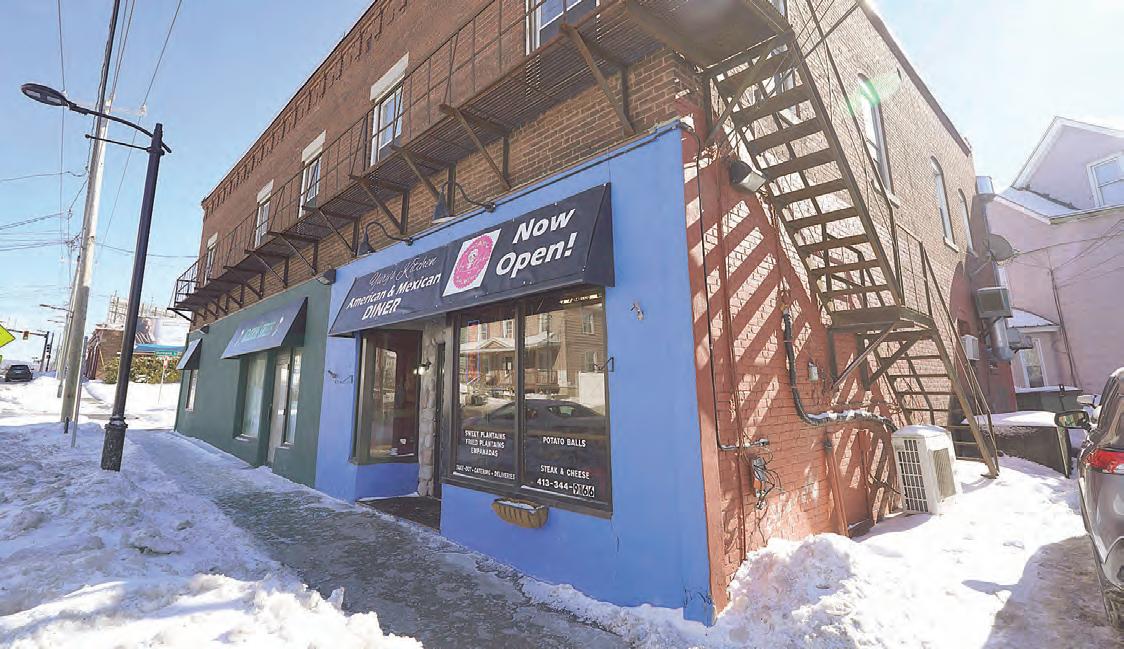
of breakfast items.
“We wanted to have that a lot of options for the people to try… we wanted to have the one place that can offer both options,” said Gustavo Cruz, Zaragoza’s husband and co-owner of Yury’s Kitchen.
Before moving to Pittsfield, Cruz spent seven years working at the Great Barrington Bagel Co. Zaragoza said she opened Yury’s Kitchen in part to be closer to her children.
The restaurant at 496 Tyler St. is
open 8 a.m. to 8 p.m. Monday through Saturday (closed Wednesdays) and 8 a.m. to 7 p.m. Sundays, serving American food for breakfast (8 a.m. to 2 p.m.) and Mexican dishes for lunch and dinner (12 p.m. to 8 p.m.).
The couple also opened the restaurant to share Oaxacan traditions with the Pittsfield community.
The restaurant’s interior features vibrant pink, blue and yellow walls, with handmade Oaxacan paper decorations

hanging from the ceiling in homage to the streets of Oaxaca.
“In downtown [Oaxaca] all the houses, everything, they’re really colorful…. also the streets are decorated with those type of [paper] decorations,” Cruz said.
The restaurant also offers Mexican beverages, desserts and catering.
“We are from Oaxaca, so we want to share all the traditions here,” Zaragoza said.







By H eat H er Bellow
GREAT BARRINGTON — In this town, everyone has their favorite Baba Louie’s pizza pie.
But after 25 years of knowing their favorites were a quick walk or drive away, residents will now have to travel to Hudson, N.Y., to get their “woodfired all-natural sourdough pizza.”
Owners Paul and Eileen Masiero closed the Railroad Street restaurant on March 1. Their other Baba Louie’s restaurant at 517 Warren St. in Hudson will remain open.
“Cheers to a wonderful adventure that has come to its end,” the couple said in a Feb. 5 note on their website.
Paul Masiero told The Eagle the decision to close came on the heels of an impasse over the lease with his landlord, Richard Stanley.
It is unclear what will replace the restaurant in the corner storefront, according to Stanley.
The Masieros expanded the restaurant to 100 seats in 2019 by moving the cramped Main Street business to the corner Railroad Street location that had previously been leased by the restaurant Allium.

location because he and Stanley could not “come to terms on the negotiation, and I felt that the price was a little high.”
Masiero said he wanted a one-year lease, but that Stanley wanted him to sign a fiveyear lease with “two five-year options.”
Stanley said that for the last few years he had been flexible with the Masieros’ need for short lease “extensions,” and that he was “happy to go along with it, given how long he’s been in business.”
The price the Masieros were asking for the business was too high and “unrealistic,” Stanley said, noting that this factored into the situation. “It’s a good business, but at the end of the day it’s worth only what someone will pay and as a business the numbers have to make sense.”
The restaurant is a Berkshires icon that Masiero said will be missed.
“I’ve had so many customers come in and tell us how sad they are,” he said. “We just really wanted to hand it off to someone who could keep running it.”
The couple opened a successful Pittsfield location in 2010, and closed it five years later to “spend more time with family.” They continued to operate Ugly’s Gluten Free Bakery, which sells sourdough pizza crusts and other products wholesale, as well as another bakery that makes the regular sourdough crusts and products. Paul Masiero said he will continue to focus on these bakeries and grow them.
two-story building.
In early 2024 the Masieros put the entire pizza “empire” — as their real estate listing said — on the market for $2.5 million. It included the Great Barrington lease at 42/44 Railroad St. as well as the Hudson location with its
“These folks just want to retire,” their real estate agent, Steven Weisz, said of the Masieros last year. “They’ve done it for a while. They want to pass it along while the business is running very nicely.”
At the time, Weisz said there







had been “a fair amount of interest, both from the New York City area as well as from the West Coast,” but that some potential buyers were interested in just one of the locations rather than both.
Paul Masiero said that he’s closing the Great Barrington
He also feels for his longtime employees, now out of a job. On their website, the Masieros thanked their staff for their “kindness, grace and hard work,” and thanked the community for creating so much “joy and connection that it will be what we miss most in our next chapter.”
They also thanked their three children who have “supported, endured, participated, laughed and cried right along side us.”
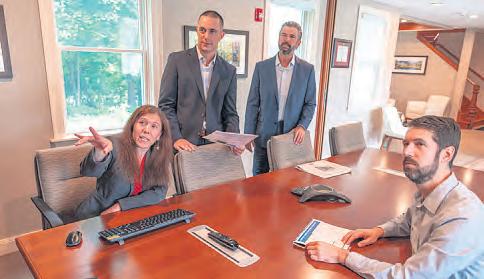
Togetherwe’llcraft a plandesignedtomeetyour goals. We’dliketohearyourstory, andthatstartswith a conversation.

During uncertain times, we’re grateful for our state agency, the Massachusetts Nonprofit Network (MNN), as well as the National Council of Nonprofits for their advocacy and assistance navigating change. Let’s start with this good news from MNN.

POSITIVE REFORMS
ENACTED
MNN describes two very positive pieces of legislation.
“In an effort to encourage job creation and growth in Massachusetts, the Legislature recently passed, and Governor Healey signed, H5100, an Act relative to strengthening Massachusetts’ economic leadership.”
This legislation encourages representation on boards by allowing a small stipend for board volunteers, and supports nonprofits through updated requirement thresholds. MNN worked to build support for and secure passage of these reforms.
Nonprofit board members may now receive a stipend up to $500 for their time and efforts related to board service without losing state statutory civil liability protections. Previously, if a nonprofit board member received compensation, they would not be entitled to the personal civil liability protections afforded by Massachusetts General Law Chapter 231 Section 85W. This change was proposed by MNN, and is in line with the Federal Volunteer Protection Act, which provides similar protections for nonprofit volunteers so long as they are not compensated more than $500.
“Allowing board members to receive a modest stipend for their time and effort will do a great deal to advance
equity and representation for nonprofits and the people they serve,” said MNN CEO Jim Klocke. “This provision enables nonprofits with smaller budgets to encourage board participation from individuals who may not otherwise be able to serve because of financial constraints. MNN hopes that with the allowance of a stipend, nonprofit boards will gain valuable voices and improve board representation.”
Additionally, Massachusetts raised the thresholds for requiring nonprofits to submit reviewed or audited financial statements. Now, organizations that have gross support and revenue of more than $500,000 in a fiscal year (compared to $200,000 previously) must submit financial statements that have been reviewed or audited by an independent certified public accountant (CPA). Whether the statements must be audited or reviewed now depends on whether the gross support and revenue exceeds $1,000,0000 (compared to $500,000) in that year, with audits required for those with $1 million or more.
“MNN applauds the Legislature for recognizing the need to raise the thresholds, as they were last updated in 2008,” Klocke said. “Inflation and rising costs are straining nonprofits. This legislation alleviates a costly requirement and will have a real and important impact on smaller to medium-sized nonprofits.”
NPC board member Laurie Werner attended a webinar on the Trump administration’s

Nonprofit Center of the Berkshires board member Laurie Werner attended a recent webinar on the Trump administration’s executive order on Diversity, Equity & Inclusion. She recommended that organizations be precise in their definitions of DEI, to ensure practices are clear on websites and other public communications, and that employees are trained to avoid pitfalls.
executive order on Diversity, Equity & Inclusion, and shares her observations below. The webinar was sponsored by the Council on Foundations, Independent Sector, National Council of Nonprofits, and United Philanthropy Forum.
“There are actually two Executive Orders, one focused primarily on the federal government and its direct contractors, and a second that has more relevance to the private sector, including nonprofits,” Werner writes. “The latter is the EO that was the focus of the webinar. The text that they recommend all nonprofits read is available on the whitehouse. gov website under “Presidential Actions” and “Ending Illegal Discrimination and Restoring Merit-Based Opportunity.” Section 4 is specifically relevant to the private sector.
Most of the commentary was presented by a lawyer who specializes in employment law and DEI. She was very clear in explaining the implications of the order and what we know and don’t know. They stressed several times that each organization’s circumstances are different and to obtain your own legal counsel if you have specific concerns.
• The order speaks of DEI practices as “discriminatory” and a civil rights violation, and is intended to get organizations to panic and “over-correct.”
• Nothing in the order changes Title VII of the 1964 Civil Act, which protects employees and job applicants from employment discrimination based on race, color, religion, sex and national origin. It only says that DEI practices will be examined and investigated by
the federal government.
• The order directs each federal agency to identify “the most egregious and discriminatory DEI practitioners in each sector of concern” and “identify up to nine potential civil compliance investigations of public traded corporations, large nonprofit corporations, foundations with assets of $500 million or more, state and local bar and medical associations, and institutions of higher education with endowments over $1 billion.”
• Smaller nonprofits do not fall into the latter category, but the scope of the order is wide and vague enough that all nonprofits should review their practices and communications related to DEI. The full implications of the EO for the private sector are still unclear.
• Recommended that each organization define exactly what you mean by DEI to avoid language that can be willfully misinterpreted by those who want to attack you. (E.g., make clear that it does not mean you hire or promote unqualified people.) Make sure your actual practices are clear on your website and other public communications, and that employees are trained to avoid pitfalls.
• Key principles for nonprofits: — Keep to your mission and values — Protect your ability to carry out your work — Don’t over-correct out of panic
The Nonprofit Center of the Berkshires shares information from state and national agencies on its list serve. To join the NPC list serve, send a blank email to Berkshires-subscribe@ missionbasedmassachusetts.net
Liana Toscanini is the founder of Nonprofit Center of the Berkshires.
For those of us in the cannabis industry here in Massachusetts, the past year has been a master class in resilience.

We’ve watched as the current administration, Congress, and the Supreme Court have all played their parts in an uncertain regulatory theater, teasing us with the promise of rescheduling cannabis while simultaneously punting the issue to the next administration.
The Department of Justice signaled its intent in April 2024, leading to over 43,000 public submissions for rescheduling by July. But by September, progress stalled. And now? With a new administration and a Drug Enforcement Administration (DEA) that appears anything but supportive, the writing is on the wall: no one is coming to save us. For those who built their businesses on the belief that the industry was set for an inevitable, linear path to federal acceptance, the past year has been a rude awakening. The old playbook — “If you build it, they will come,” “Selling weed is easy,” “Brands don’t matter” — was always flawed.
The cannabis industry is not a gold rush. It’s a war of attrition, a game of inches. And those who survive will be those who adapt. Here are ways to do
it and ways we are doing it at Canna Provisions.
The sooner we stop viewing cannabis as an anomaly and start treating it like a consumer packaged good (CPG), the better off we’ll be. In traditional retail, success isn’t just about having a good product; it’s about capitalizing on every opportunity right out of the gate, thinking beyond the boundaries of an industry in regulatory limbo, and prioritizing customer experience above all else.
At Canna Provisions, we took this philosophy to heart and doubled down on what matters most: our customers. We invested in lifestyle and convenience, ensuring that our stores don’t just sell products — they create an experience.
video, blogs and dynamic menus.
While others waited for regulators to throw the industry a lifeline, we took the fight directly to them. As the lead plaintiff in a lawsuit against the U.S. Attorney General, we refused to accept regulatory stagnation as the status quo. This wasn’t just about defending our business — it was about holding policymakers accountable to an industry that generates billions in revenue while still being denied fundamental banking protections and fair taxation. The lawsuit is moving forward, and we intend to see it through.
For those who built their businesses on the belief that the industry was set for an inevitable, linear path to federal acceptance, the past year has been a rude awakening.
We implemented a loyalty program that truly rewards engagement. We mastered the Google game, optimizing our search presence to meet customers where they are. We didn’t wait for change—we built our own momentum through education, launching classes tailored to target audiences, and engaging customers through
Beyond litigation, we expanded our approach to business itself. We returned to consulting, helping dispensaries in distress navigate the turbulent market. We built out sales training and merchandising strategies that turn struggling operations into viable businesses. We embraced e-commerce and alternative product lines, ensuring we were ready for any shifts in market demand. And most importantly, we built a fu-
ture-proof model by forming an employee stock ownership plan (ESOP), making Canna Provisions a company truly owned by the people who power it. We win together. We plan exits strategically. We control our own destiny.
Success in cannabis is not won in leaps and bounds. It is fought for inch by inch, decision by decision, relationship by relationship. Every customer interaction matters. Every piece of content matters. Every strategic pivot matters. Most importantly, cannabis is a team sport. Anyone still trying to go it alone in this industry is already losing. We win by sharing knowledge, strengthening our networks, and leveraging collective expertise to push through an industry landscape that remains frustratingly uncertain. At Canna Provisions, we’re not waiting for the game to change — we’re playing to win with the pieces we have now. So, to those still waiting for Washington to swoop in and fix this industry: stop waiting. Take control. Build your customer base, strengthen your operations, and fight for every inch. Because no one is coming to save us — but together, and with the right eyes and approaches to innovation and survival, we can save ourselves.
Meg Sanders is CEO of Canna Provisions.

In an effort to address housing shortages and provide homeowners with more flexibility, Massachusetts has introduced significant changes to Accessory Dwelling Unit (ADU) regulations under the Affordable Homes Act. This policy shift enables homeowners to build ADUs more easily, offering a practical solution to the state’s growing housing needs.
The new Massachusetts law permits accessory dwelling units (ADUs) by right as part of the Affordable Homes Act, signed into law by Gov. Maura Healey in August 2024. This legislation became effective on Feb. 2, 2025. Under this act, homeowners in single-family residential zoning districts can construct ADUs up to 900 square feet or 50 percent of the size of the primary dwelling, whichever is smaller. The ADU must have a separate entrance and comply with local building codes and any additional municipal regulations.
The term “by right” means that municipalities cannot deny a homeowner’s application to build an ADU on a single-family zoned lot, provided all reasonable dimensional and safety requirements are met. This eliminates the need for discretionary permits, streamlining the approval process for homeowners.
ADUs, commonly known as in-law suites or granny flats, are secondary housing units located on the same lot as a primary residence. These units can be attached to the main home, such as a converted basement or garage, or built as standalone structures within the property’s boundaries. ADUs provide homeowners with opportunities for additional rental income, multigenerational living, or more efficient use of existing residential spaces.
KEY PROVISIONS OF THE NEW REGULATIONS
The Affordable Homes Act amends the state’s Zoning Act to allow ADUs up to 900 square feet in single-family zoning districts. These new provisions require that ADUs maintain a separate entrance, either directly from the outside or through a shared entry hall or corridor, ensuring compliance with state building codes. Additionally, the size of an ADU must not exceed 900 square feet or half the gross floor area of the principal dwelling, whichever is smaller. Homeowners must also comply with local municipal restrictions, which may include additional size limitations

homeowners in single-family residential zoning
ADUs up to 900 square feet or 50 percent of the size of the primary dwelling, whichever is smaller.
or prohibitions on short-term rentals if imposed by the city or town.
ADDITIONAL REGULATIONS AND CONSIDERATIONS
To prevent excessive restrictions and ensure fair implementation, the new regulations establish clear guidelines on what municipalities can and cannot regulate. ADU design standards cannot be stricter than those for single-family homes, avoiding excessive costs or impractical requirements. Setback, height, bulk and lot coverage limits must be at least as permissive as those for single-family homes, and municipalities cannot require a minimum lot size for ADU construction. There is no requirement for separate water, sewer, or electric connections unless mandated by state law or utility providers, and emergency access rules cannot be strict-
er than the state fire code. ADUs must comply with state environmental laws, but local environmental regulations cannot be stricter than those applied to single-family homes in the same zoning district. In historic districts, stricter standards may apply, but they must remain reasonable and cannot entirely prevent ADU construction.
By legalizing ADUs statewide, Massachusetts has streamlined the approval process, making it easier for homeowners to expand housing options.
By legalizing ADUs statewide, Massachusetts has streamlined the approval process, making it easier for homeowners to expand housing options. While local governments may still enforce certain restrictions, the law ensures
these remain reasonable. Homeowners interested in building an ADU should consult their local planning department to ensure compliance with zoning laws and building codes. You will find in many Berkshire communities, there are conversations and agenda items at town meetings to discuss the local regulations for residents to take advantage of these new opportunities in adding space to their existing home.
As interest rates have increased in the last few years, vehicles such as CDs and money market funds have increased in popularity. The total amount held in money market funds in the U.S. has doubled in just the last two-plus years, increasing from around $1 trillion to more than $2 trillion in these funds.

vestments, often called cash equivalents. This is seemingly sensible because CDs and money markets have little risk of default and deliver consistent interest payments. Making 4 or 5 percent is especially attractive relative to the 1 or 2 percent people were earning just a few years ago.
A typical money market fund currently yields just above 4 percent and was yielding closer to 5 percent early last year. Similar rates can be found on CDs of various maturities. These interest rates are tempting, especially if you have money that has been sitting in the bank earning next to nothing for years.
Anecdotally, I come across a lot of people who are comfortable holding a good deal of their wealth in these super safe in-
CDs, money markets, and other emergency savings are a critical component of a sound financial plan. Most people are probably well-served keeping some amount of their money in these secure vehicles.
But CDs and money markets have not historically been the best way to grow wealth. This is where we need to explore the importance of compound growth to understand how money grows exponentially at even marginally higher rates
of return.
Let’s say we can hypothetically get a safe and secure 5 percent return every year. This is not currently possible and has not been possible for a while, but we’ll just pretend for the sake of example. If you took $100,000 and invested in this secure income stream, you’d have $105,000 after one year. You’d then earn 5 percent on that amount, giving you $110,250 after two years. This growth compounds on itself over time, hence the term compound interest.
At the end of 30 years, your $100,000 earning 5 percent per year would be worth over $432,000. That is the power of compound interest, assuming you reinvest the interest every year.
But what if you invested in a moderate risk portfolio of stocks and bonds? Surely, it would be more volatile and en-
tail more risk as compared with the safe 5 percent we assumed above. But the hypothetical growth over long periods of time may compensate you for taking that risk.
Assume a simple investment portfolio comprised of the Vanguard Balanced Index Fund (VBIAX). This simple fund allocates roughly 60 percent to the broad US stock market and 40 percent to the US bond market. There are years where a fund like this suffers, such as 2022 when the fund was down nearly 17 percent.
But the long-term return on a balanced fund like this is about 7 percent. Since its inception in November 2000, the annualized return after expenses has been 6.96 percent per year. This includes terrible stretches such as the dot-com bubble bursting and the financial crisis in 2008.
Seven percent doesn’t seem all that different from 5 percent
when it comes with all that volatility. After one year of 7 percent return, a $100,000 investment would be worth just $107,000, not all that much better than the safe investment. At the end of 30 years though, a $100,000 investment would turn into more than $760,000 with a 7 percent return. That small 2 percent difference in returns creates an additional $329,000 in wealth. The longer the investment period, the greater this difference in outcomes becomes.
This may be the easiest way to create wealth. Invest money and give it time. It’s a rare millionaire that invests most of her wealth in CDs. But the stock market has been a wealth-generating machine for many decades.
Luke Delorme is director of financial planning at Tableaux Wealth in Stockbridge.

On Aug. 13, 2014, Stephen Boyd, founding chair of the Berkshire Innovation Center, stood before the Pittsfield City Council presenting on his proposal to build an Innovation Center in the William Stanley Business Park.

He recounted a research study that he had read which had overwhelmingly concluded that “effective collaboration was best done in person because people engage when they can hear and see each other the same way humans have done so for a thousand years.” That same study, Boyd explained, also concluded that “the primary reason that people collaborate is to innovate — that they are interrelated.”
Last month — more than 10 years since Boyd first presented the concept for an Innovation Center to city officials — the BIC was recognized by MassEcon with an Innovation Excellence Award. Only the second-ever recipient of this “special award,” MassEcon selected the BIC in recognition of its role “in driving innovation and sustainable growth of the technology-focused economy of the Berkshires.”
In the decade between his presentation to local officials and the recognition by the state’s champion for business growth, Boyd served as chair of the BIC’s board of directors and dedicated countless hours to turning an idea into a very real and thriving catalyst for growth in our regional economy.
This included building a vast coalition of industry, academic and governmental leaders who provided key input to shape and mature the idea, and lobbying for private, local and state funding necessary to realize the dream of a new center. It also included overseeing the design

and construction of the new facility; developing a sustainable business and staffing model and making the first hires for the organization; cutting a ribbon to open the doors of the new facility; and guiding the new organization through its first five years with the facility in operation — which happened to coincide with a global pandemic.
Throughout this, Boyd held together a coalition of fellow leaders who embraced the vision and threw their time, energy and expertise behind the effort at every turn — and there were plenty of ups and downs along the way. Founding board members who continue to serve to this day include Doug Crane, Ellen Kennedy,
Countless others from our community have leaned in along the way, whether by joining the board, serving on a committee or in an advisor capacity, signing up as BIC members, supporting the effort financially, or just by actively engaging in this mass effort of “innovation through collaboration.”
I’ve known Steve Boyd for a very long time, but when I first heard of the Berkshire Innovation Center I had not seen or spoken to him for close to 20 years. We were reacquainted and started meeting every few months as the project was
coming together and construction began. I didn’t quite “get it” at first, but Steve’s passion and vision were energizing and inspiring and when he asked me to serve as the BIC’s executive director in June 2019, I quickly jumped at the opportunity, and I’m glad I did. It has been an incredibly rewarding experience, both because of the impact we are making and because of the leaders who have become mentors to me — none more so than Steve Boyd.
In stepping in, I didn’t know much about advanced manufacturing or the “innovation economy,” but Steve has locked arms every step of the way, patiently supporting and always teaching, while also giving space for me to grow as a leader in my own way.
Earlier this year, Boyd and longtime Vice Chair Peter Stasiowski passed the chair and vice chair role to new leaders — James Kupernik and Giovanna Fessenden Fairbank. Boyd and Stasiowski are both remaining on the board and both will continue to drive major new initiatives, but both recognize that transitioning to new leadership is good for the long term health of the organization.
The process was thoughtful and gradual and the organization is in great hands. Embedded into every fiber of the organization is Boyd’s fundamental belief in the importance of community connectedness and the power of collective wisdom.
Kupernick and Fessenden Fairbank have embraced this, have hit the ground running, and are eager to build on the strong foundation that has been laid over the last decade plus. I’m looking forward to working with them and excited for this next chapter.
Real estate transactions for Jan. 6-31
ADAMS
97 Commercial Street LLC sold property at 17 Commercial St., Adams, to Sincerity Builds LLC, $375,000.
Bruce G. Goyette sold property at 7 Bieniek Ave., Adams to Sonya Boesse, $221,000.
Stephen J. and Leslie A. Bransfield sold property at 14 East Orchard Terrace, Adams, to Marion and David Harmon, $347,000.
Mountain Stream LLC sold property at East Mountain Road, Adams, to Pranam Lipinski, $100,000.
Michael Marchinetti and Amber LaFountain sold property at 15 North Summer St., Adams, to Hurricane Properties LLC, $165,000.
David C. Field sold property at 5 East Hoosac St., Adams, to Grey Fox Realty LLC, $160,000. Adams Ambulance Service Inc. sold property at 185 Columbia St., Adams, to Anthony P. Doyle, trustee of the Six Seven Four Housatonic NT, $350,000.
Richard P. and Donna M. Powers, trustees of the Richard and Donna Powers Adams Irrevocable RT, sold property at 19 Highland Ave., Adams, to Mitchell Biernot, $285,000.
ALFORD
Cloud Kingdom 2020 LLC sold property at 275 East Road, Alford, to Claude J. Borenzweig and Louise A. Feldman, $720,000.
BECKET
Mountain Stream LLC sold property at 444 Gentian Hollow Road, Becket, to Michael E. Sayers, $49,900.
Gary Arthur Aeschliman sold property at 47 Porcupine Loop, Becket, to Jacquelyn Elaine Maynard, $160,000.
Timothy Radville and Kimberly Edwards sold property at 278 Main St., Becket, to Samuel and Kimberly Brown, $42,000.
Paul F. and Nancy B. Mazut, trustees of Paul F. Mazut RVT of 2012, and Nancy B. and Paul F. Mazut, trustees of Nancy B. Mazut RVT of 2012, sold property at 86 George Carter Road, Becket, to Anthony Joseph Scibelli, $805,000.
Livia Landry sold property at 128 YMCA Road, Becket, to Joel and Barbara Behar, $360,000.
Wendy Kay sold property at 266 Moberg Road, Becket, to Maura Dykstra, $650,000.
Selena A. Drabick sold property at Wade Inn Road, Becket, to Sean G. and Michelle L. Raymer, $50,000. Arnold S. Berkman, trustee, Arnold S. Berkman Trust, and Patience B. Berkman, trustee, Berkman 2013 RT, sold property at 494 Woodmere Road, Becket, to John R. and Rebecca B. Russell, $632,000.
CHESHIRE
Lori J. Bracci, Jill A. Staffin and Keith R. LaFrance, co-trustees of the LaFrance Family NT, sold property at 457 Savoy Road, Cheshire, to Nicholas F. and Ashley Lynn Penna, $375,000.
Deborah Tenczar sold property at 236 Devonshire Drive, Cheshire, to Karen A. Lombardi, $328,000.
Joan Haskins sold property at 153 Shadowland Cove, Cheshire, to Yong Ju No, $367,050.
Richard W. and Mary L. Jennings sold property at 64 North St., Cheshire, to 64 North Street Cheshire LLC, $450,000.
CLARKSBURG
Jeffrey Brassard, Michael Brassard and Paul R. Brassard Jr. sold property at 65 School St., Clarksburg, to Skyler Joseph Poplaski and Shannon Baptiste Charbonneau, $200,000.
Lea King, trustee of the Lea King Trust, sold property at 373 Horrigan Road, Clarksburg, to Howard S. Gumpel, $1,100,000.
DALTON
Susan A. Dapson sold property at 97 North St., Dalton, to Hunter W. Johnston, $303,500.
David F. Boino and Jeanne M. Boino, personal reps. of the Estate of John T. Boino; Thomas M., Kevin J. and Maureen E. Boino, and Deborah A. Agar sold property at 55 Eleanor Road, Dalton, to Breanna R. Lytle and Noah Farevaag, $245,000.
NAMV Investments LLC sold property at 756 Old Windsor Road, Dalton, and 10 Old Windsor Road, Hinsdale, to Kyle Noyes, $290,000.
John G. McCann III sold property at 280 Kirchner Road, Dalton, to Paul J. and Lisa A. Hebert, $250,000.
EGREMONT
Christopher B. Stanton and Joanne Gallagher
Stanton sold property at 64 Sheffield Road, Egremont, to James Sabia and Lisa Weiss Sabia, $405,000.
GREAT BARRINGTON
Emily J. Wagner sold property at 54 Castle Hill Ave., Great Barrington, to Jefferson D. Meighan and Marcia A. Konrad, $516,250.
Suzanne Arre sold property at 3 Pothul Drive, Great Barrington, to Melinda Baker, $851,000.
Berkshire Natural Resources Council Inc. sold property at 0 Park St., Great Barrington, to Great Barrington Affordable Housing Trust Fund, $86,850.
Brian James Beckwith and Amanda Marie Beckwith sold property at 138 Lake Buel Road, Great Barrington, to Cody Ranolde and Hayley Ranolde, $575,000.
Patricia Anne Woods sold property at 34 Bridge St., Unit 303, Residences at Powerhouse Square I Condominium, Great Barrington, to Mark Manton and Marcella Manton, $650,000.
Estate of Jean F. Murphy sold property at 1 Forrest St., Great Barrington, to Michael Aronson and Rebecca Aronson, $340,000.
Linda K. Baxter sold property at 19 Pleasant St., Great Barrington, to Dock Road LLC, $774,000.
Michael A. Kiriakedes and Barbara J. Kiriakedes sold property at 154 Main St., Great Barrington, to LiCoMo GB LLC, $995,000.
Susan E. Giddings sold property at Long Pond Road, Great Barrington, to Steven S. Miller, $100,000.
Cisshill73 LLC sold property at 73 Christian Hill Road, Great Barrington, to Hao Chen and Jinjin Song, $355,000.
Philip J. Pryjma and Maureen M. Pryjma, co-trustees of both the Philip J. Pryjma Revocable Trust and the Maureen M. Pryjma Revocable Trust, sold property at 301 Monument Valley Road, Great Barrington, to Luke P. Pryjma and Britta Schellenberg, $110,000.
Estate of Edward Philip Rogers sold property at 15 Cottage St., Great Barrington, to Julie R. Rose and William G. Rose, $1,050,000.
Kathleen Martin, trustee of Margaret M. Moran Nominee Realty Trust, sold property at 11 Highland Drive, Great Barrington, to Jeffrey E. Moran and Hannah P. Moran, $550,000.
CMB Properties LLC sold property at 965 South Main St., Great Barrington, to Berkshire Resources for Integration of Diverse Groups & Education Inc., $1,150,000.
Mark B. Manton and Marcella Manton sold property at 34 Bridge St., Unit 205, Residences at Powerhouse Square I Condominium, Great Barrington, to Deborah Perloe, $450,000.
Sandra Smith and Karen Guidi sold property at 215 Oak St. North, Great Barrington, to Ryan Guidi and Sarah Fol, $240,000.
HANCOCK
Paige M. Gleason and Scott Barbeau sold property at 2161 Hancock Road, Hancock, to James and Marilyn Wittmer Etchison, $373,120.
Trena Lyn Depel sold property at Corey Road, Unit 866, Hancock, to Paul A. and Susan D. Diesu, $490,000.
Cynthia Adams Gravel and Richard M. Adams sold property at 37 Corey Road, Unit 842, Hancock, to Allison Pacelli and Seth Zepka, $400,000.
Lucas M. Winters sold property at 2792 Hancock Road, Hancock, to Timothy and Laurie Hoar, $350,000.
HINSDALE
Nancy A. Burt sold property at 125 Pine Cone Lane, Hinsdale, to Patricia Ferrari-Behan and Cybele Kilby, $490,000.
LANESBOROUGH
Katharine C. Westwood sold property at 11 Glassworks Road, Lanesborough, to Tessa R. Dilego, $180,000.
Robert J. Wirtes and Pamela A. White-Wirtes, trustees of the Robert J. Wirtes Trust, sold property at 705 North Main St., Lanesborough, to Pineway Equestrian Center LLC, $700,000.
Cody J. Sanderson and Haille M. Burkart sold property at 14 Juleann Drive, Lanesborough, to Sarah Elizabeth Royal and Rita Emilia Gomes, $300,000.
Richard S. Ashkar sold property at 73 Bailey Road, Lanesborough, to Martha E. Prevey, $435,000.
Douglas B. and Sally A. Wilcox sold property at 46 Pease Terrace, Lee, to David A. Duquette, $115,000.
Paul A. Faggioni Jr. and Cindy L. Faggioni sold property at 15 Joseph Ave., Lee, to Charles R. Nagelschmidt II and Denise R. Nagelschmidt, $485,000.
Peter L. Rybacki, trustee, John M. Rybacki Revocable Living Trust, sold property at 30 & 35 Chanter Road, Lee, to Eladio Mendoza Hernandez and Perla Mendoza, $335,000.
Stephen C. and LaVonne M. Brown sold property at 80 Via Maria, Lee, to Anthony T. and Ashton Casey-Wimperis, $599,900.
Johnna Digrigoli sold property at 320 Pleasant St., Lee, to Joseph and Regan Jannesse Carlotto, $284,500.
LENOX
Richard H. and Deborah A. Fuore sold property at 133 West Dugway Road, Lenox, to Jessica L. DePippo, $675,000.
Sidney Koch and Sheila Nevins sold property at 165 Kemble St., Lenox, to CCD Canyon LLC, $2,450,000.
William C.F. Kurz and Deborah B. Kurz sold property at 3 Highcrest Road, Lenox, to Jay M. and Audrey H. Pabian, $900,000.
Carolyn L. Barry sold property at 215 West St., Lenox, to Norman A. and Robin First, $370,000.
David M. Nolan and Lisa Sam, trustees, Cathleen C. Nolan RVT, sold property at 107 Cliffwood St., Lenox, to 107 Cliffwood LLC, $1,187,500.
Jonas and Elizabeth D. Dovydenas sold property at Under Mountain Road, Lenox, to Eric Crombez and Ryan Doremus, $25,000.
MONTEREY
Green River Holdings LLC sold property at 85 Pixley Road, Monterey, to 23 Seven Arts LLC, $590,000.
Matthew A. Amstead and Mitchell D. Amstead sold property at 241 Main Road, Monterey, to
Felipe De Jesus Martinez Hamilton, $690,000.
MOUNT WASHINGTON
Jacqueline Sugrue sold property at 3 East St., Mount Washington, to Rachel Burch, $274,000.
NEW MARLBOROUGH
David L. Stanisz sold property at Route 57, New Marlborough, to David A. Lupiani, $10,000.
Alan Berko, trustee of Jerome Berko and Henrietta L. Berko 2012 Family Trust, sold property at 1333 Norfolk Road, New Marlborough, to TNPointF LLC, $2,100,000.
NORTH ADAMS
C. Jason Carlisle, personal rep. of Juanita D’Alessandro, sold property at 38 Beech St., North Adams, to V. Peter and Dawn A. Vadnais, $120,000.
Meng Wu and Ya Ling Wang sold property at 160 Phelps Ave., North Adams, to Ryan D. Dubie, $255,000.
John R. Franzoni and Ellen M. Sutherland sold property at 154 East Ave., North Adams, to Kevin A. and Lisa J. Lamb, $590,000.
ESP Realty Holdings LLC sold property at 376 Union St., North Adams, to Hendrix Homes LLC, $322,000.
Michele and Darrell Harrington sold property at 38 Murray Ave., North Adams, to Rosando Tucker, $185,000.
Ellies Holdings LLC sold property at 28 Goodrich St., North Adams, to Michael and Darlene Seaborne, $225,000.
Elizabeth Marr and Mitchell Masterson sold property at 39 Burnham St., North Adams, to Denise McHale, $252,000.
Deborah J. Trybus sold property at 1433 Massachusetts Ave., North Adams, to Centerville Sticks LLC, $20,000.
Roderick Stanbrook and Ulrike Nagel sold property at 35-37 Bracewell Ave., North Adams, to Malik Ferril, $273,000.
Page 21






FROM PAGE 20
Laura M. Baker, individually and personal rep. of Stephen C. Bruno, sold property at 7 Birchwood Terrace, North Adams, to David Whelpley, $228,000.
Greylock WORKS West LLC sold property at 520 State Road, Unit 404, North Adams, to Thomsen404 LLC, $1,490,400.
Field Property Development LLC sold property at 63 Addison Ave., North Adams, to Addison 14 Properties LLC, $100,000.
Mark K. and Pamela J. Wittig sold property at 255 Phelps Ave., North Adams, to Alexander R. and Kami E. Morse, $250,000.
JATO LLC sold property at 310 State St., North Adams, to Matthew J. Tatro, $375,000.
OTIS
Joseph D. Daley sold property at 70 New Hollywood Boulevard, Otis, to John Crowson, $350,000.
Susan J. Fahlund sold property at 259 Werden Road, Otis, to Peter Kleinbard and Kathryn Weinstein, $422,500.
PERU
Stephen E. Groat, personal rep. of the Estate of Julia Lorraine Groat, sold property at 16 Bonny Lane, Peru, to Ernest J. Kemp Jr.. $141,000.
PITTSFIELD
William F. McDevitt sold property at 163 Hancock Road, Pittsfield, to Matthew Clemons, $230,000.
Karen A. Hassett sold property at 168 Partridge Road, Pittsfield, to Christine A. Frenier, $145,000.
Jacob F. and Jessica Lensk sold property at 22 Allengate Ave., Pittsfield, to Sharleen Pietrello, $342,500.
Chelsea M. Szmania sold property at 39 Catherine St., Pittsfield, to Catherine and Stephanie VanBramer, $240,000.
Taylor A. Bartlett sold property at 205 Lenox Ave., Pittsfield, to Daniel McGonagle and Elvira Tejeda, $250,000.
Eric P. Greene sold property at 26 Crestview Drive, Pittsfield, to De Vries Building LLC, $145,000.
Marcel L. Archambault sold property at 42 Lucille St., Pittsfield, to Zachary Mathes, $235,000.
U.S. Bank Trust NA, trustee, sold property at 14 Bay State Road, Pittsfield, to Bungalow Properties IV LLC, $130,350.81.
Kelly C. and Millicent C. Southard sold property at 81-83 Lincoln St., Pittsfield, to Betty J. and Michael J. Watford, and Lemon Wilder, $235,000.
Kathleen M. Connor, trustee, Kathleen M. Connor Living Trust, sold property at 14 Filomena Drive, Pittsfield, to David J. and Anna Lotto, Norah M. Walsh and Liam Gorman, $900,000.
Deborah A. Southard, trustee, Dorothy E. Barnes and Richard C. Barnes FT, sold property at 109 Highland Ave., Pittsfield, to Samantha Kendall, $190,000.
Dalton Center Block LLC sold property at 53 Draper Ave., Pittsfield, to Nicholas Donahue, $269,500.
ACM Properties LLC sold property at 236 South St., Pittsfield, to Everest Realty LLC, $330,000.
Robert P. Maloney and Mark A. Mancivalano, trustees, Mancivalano-Maloney FT, sold property at 202 Blythewood Drive, Pittsfield, to Jeffrey A. and Sheera K. Siegel, $1,500,000.
James K. Regan sold property at 884 West Housatonic St., Pittsfield, to Matthew W. and Vicki J. Alibozek, $294,000.
Amanda M. Borsotti sold property at 38 Birch Grove Drive, Pittsfield, to Keegan and Hunter Strzempko, $345,000.
Duta Real Estate LLC sold property at 17-19 Wallace Place, Pittsfield, to 71 Center St. LLC, $120,000.
Duta Real Estate LLC sold property at 71 Center St., Pittsfield, to 71 Center St. LLC, $100,000.
Ebenezer Odom Baafi and Felicity Grace Andrus sold property at 28 Hopewell Drive, Pittsfield, to Brian J. Huebner and Helen H. Moon, $270,000.
Kenneth Walto, personal rep. of the Estate of Virgilio J. Walto; Kenneth Walto, trustee, Carmen M. Walto 2021 RVT; and Deborah A. Sorensen, trustee, Santina M. Walto Trust, sold property at 25 Sadler Ave., Pittsfield, to Yinhai Zhao and Xiaoqian Gong, $135,000.
Susan B. Carroll sold property at 30 Wood Ave., Pittsfield, to Kelly J. Ford, $399,900.
John Joseph Fillio, personal rep. of the Estate of Richard Wildia Fillio, sold property at 875 North St., Pittsfield, to Justin Cote, $200,000.
Sarah M. Pizani sold property at 46 Rhode Island Ave., Pittsfield, to Christian J. Bianco, $223,000.
Susan L. O’Neil sold property at 637 Crane Ave., Pittsfield, to Steven H. Elser, $230,000.
Michael J. Kruger sold property at 42 New Road, Pittsfield, to Vivian Gacet, $98,000.
Paul R. and Dianne L. Matthews sold property at 56 Montgomery Ave., Pittsfield, to Alexandria Carmon, $265,000.
Lindsay M. DiCicco and Theresa A. Reed sold property at 12 Victor St., Pittsfield, to Jonah Michael Kelley, $185,000.
Ethan Harrison sold property at 59 Dewey Ave., Pittsfield, to Tim Zhang, $50,000.
124 Appleton Ave LLC sold property at 124-126 Appleton Ave., Pittsfield, to Elizabeth DiLuzio, $364,000.
Elaine K. Epstein sold property at 536 Elm St., Pittsfield, to Augustus and Leslie Digby Rizza, $329,000.
THE BERKSHIRE EAGLE
Ronald D. and Megan A. Gomez sold property at 1264 East St., Pittsfield, to North Roots Properties Inc., $232,000.
Christopher E. Smargie sold property at 98 Greylock Terrace, Pittsfield, to Jakob L. Touponce and
REAL ESTATE, Page 22

Attheendofeachmonth, whichquestiondoyouaskyourself?
Question#1:Ihavesomuchmoneyleftover, Idon’tknowwhattodowithallofit …or…
Question#2:Ihavelittlelefttoshowforallmyhard workafterIpayallofmyexpenses
Ifyouchecked#2–youneedtocallmetosee howmuchyourmonthlycreditcardprocessing feescanbereduced.
Ihavebeenverysuccessfulinsaving over65localbusinessowners moneyeachmonth.Icanprovide youwithafree,noobligation analysisofyourcurrentcredit cardprocessingprogramand seehowmuchmoneyIcan saveyou.

Referencesavailable Memberof1Berkshire,LeeChamberofCommerceand theSouthernBerkshireChamberofCommerce
FROM PAGE 21
Crystal Lynn Townsend, $193,000. Salvini Development Company LLC sold property at 40-42 Gordon St., Pittsfield, to Mireille L. Ngwelebe, $320,000.
Simone J. Hamrick, trustee, Anita B. Bakst Revocable Trust of 2008, sold property at 112 Roselyn Drive, Pittsfield, to Amabelle San Marte, David Palliardi and Kailee Soberano, $325,000.
Holly R. Warren sold property at 22 Crossin Terrace, Pittsfield, to Jeremy and Riva Gibbs, $240,000.
George W. Drosehn sold property at 107 Unkamet Park Drive, Pittsfield, to Stephan A. Vander Kraats II, $270,000.
William R. Chapman sold property at 173 Fort Hill Ave., Pittsfield, to Mindy R. Brook, $241,000. Reynold J. and Geraldine M. Galipeau sold property at 108 Clydesdale Drive, Pittsfield, to Courtney Kielman, $500,000.
Sharon Santana Jimenez sold property at 14 Clifford St., Pittsfield, to Nestor Orosman Olivera De Los Santos and Sandra Estela Da Rosa Lescano, $169,000.
James C. Messan Jr., and Linda F. Messana sold property at 40 Churchill Crest, Pittsfield, to Thomas and Cynthia Jamula, $292,000.
Jose Miguel Arias-Batista sold property at 57 Beacon Ave., Pittsfield, to Robert S., Shirley A., and Ashley Marie Keyes, $3,000.
Jose Miguel Arias-Batista sold property at 57 Beacon Ave. Pittsfield, to Edwin A. and Teresa M. May, $3,000.
Ellies Holdings LLC sold property at 247 Dalton Ave., Pittsfield, to Marx Hans and Nolan Fernandez, Ingrid Rodriguez Poveda and Fanny Correa Gomez, $282,000.
Carlos Rigonato and Marcio J. DaSilva sold property at 245-249 Francis Ave., Pittsfield, to Joshua Machado, $555,000.
Alison Steinmiller sold property at 128 Patridge Road, Pittsfield, to Kent and Shiobbean Lemme, $380,000.
John Hickam sold property at 55 Appleton Ave., Pittsfield, to Olmsted Realty LLC, $360,000. Central Berkshire Habitat for Humanity Inc. sold property at 82-84 Robbins Ave., Pittsfield, to
Christel Barhel Bikoumou and Norliche Chatlard Bikoumou nee Loufoukou Nzobadila, $174,000.
Central Berkshire Habitat for Humanity Inc. sold property at 82-84 Robbins Ave., Pittsfield, to Kouame and Ama Koblan N’Goran, $174,000.
Churchill Street Realty LLC sold property at 192 Lakeway Drive, Pittsfield, to Cassie Jean Giardina, $212,000.
Herald Properties LLC sold property at 67-69 Glenwood Ave., Pittsfield, to ESP Realty Holdings LLC, $150,000.
SANDISFIELD
Sarah D. Hubert and Andreas D. Hess sold property at Route 57, Sandisfield, to Cesar A. Guerra and Annaly Babb-Guerra, $149,900.
Mirror in Me Missions Inc. sold property at 143 West St., Sandisfield, to Carl Bierce Jr., $200,000.
Richard Wayne Stanard Jr. and Heather Lynn Stanard sold property at 8 Tannery Road, Sandisfield, to Ebony R.M. Robinson, $113,000.
SAVOY
David P. and Sue Anne Seamans sold property at Horton Road, Savoy, to Jeffrey A. and Jeffrey Destromp, $77,000.
Sheffield
Olifi Properties LLC sold property at 81 Mount Washington Road, Sheffield, to Andrew Murray, $400,000.
Olifi Properties LLC sold property at 65 Mount Washington Road, Sheffield, to James Davies and Olivia Scanlon, $1,737,500.
Sean P. Major, trustee of Audrey A. Major Revocable Trust, sold property at 27 Park Lane, Sheffield, to Robin Berthet, $325,000.
Richard A. MacDowell and Kathryn L. MacDowell sold property at 78 Ashley Falls Road, Sheffield, to Adrian K. Wagner, $559,000.
Keith Tyler sold property at 86 Ashley Falls Road, Sheffield, to Adrian K. Wagner, $86,000.
Jeremy A. Greene, Arthur R.L. Greene, Abigail M. Greene, and Jessica L. Greene sold property at 0 East Road, Sheffield, to Carly Jane Shafiroff, $121,000.
FP Lend Fund I LLC sold property at 210 Ashley Falls Road, Sheffield, to Carolyn Carlson, $565,000.
John C. Gilligan and Elsie B. Gilligan sold property at 0 Bow Wow Road, Sheffield, to Aidan J. Gilligan, trustee of R & A Realty Trust, $180,000.
Mathew D. Gasperini and Kristen M. Gasperini sold property at 28 Davis Lane, Sheffield, to Mitchell Tyler and Amber Tyler, $65,000.
STOCKBRIDGE
HLP Realty Holdings LLC sold property at 35 Church St., Stockbridge, to Susan Blair Hawkins Roelke, trustee, Susan Blair Hawkins Roelke RVT, and Brian Keith Roelke, trustee, Brian Keith Roelke RVT, $1,275,000.
Alan Marash, trustee, Alan Marash RVT, and Judi Glaser Marash, trustee, Judi Glaser Marash RVT, sold property at 22 Yale Hill Road, Stockbridge, to Gail Zauder, $1,860,000.
Olga R. and Carey Weiss, trustees, Olga R. Weiss 2018 RVT, sold property at 2 Mahkeenac Heights Road, Stockbridge, to Amy L. Sales, trustee, Amy L. Sales RVT, $145,000.
TYRINGHAM
Mark J. and April A. Curtin sold property at 119 Main Road, Tyringham, to Christine D. Regnier, $250,000.
WASHINGTON
Kari G. Altman sold property at Washington Mountain Road, Washington, to Warren Hastings, $50,000.
WILLIAMSTOWN
Matthew R. and Nina Z. Konsa sold property at 300 Syndicate Road, Williamstown, to Aileen M. Mckenna, $784,000.
Bruce M. and Deborah S. Berman sold property at 988 Hancock Road, Williamstown, to Sean Mullally and Rose Blodgett, $1,300,000.
Laura J. Photos, personal rep. of Joseph Arthur King, sold property at 60 Arnold St., Williamstown, to Seaside Capital LLC, $100,000.
Richard D. Jones sold property at 95 Bridges Road, Williamstown, to Bridges Road Real Estate LLC, $156,000.
Robin L. Bledsoe, personal rep. of John W. Bledsoe, sold property at 84 Petersburg Road, Williamstown, to Paul Hubner, trustee of the 84 Petersburg Road RVT, $250,000.
Ann M. Rathbun sold property at 893 New Ash-

ford Road, Williamstown, to Alex M. and Erica L. Bulger, $496,800.
Kristen L. Johanson sold property at 44 Northwest Hill Road, Williamstown, to Eric D. and Gloria J. Koster, $1,150,000.
Eric J. and Christine L. Enderle sold property at 55 Thornliebank Road, Williamstown, to Benjamin J. and Mamiko Schonbeck, $485,000.
David B. Dupee Jr. and Martha E. Prevey sold property at sold property at 697 Henderson Road, Williamstown, to Hector Palestino Castro, $685,000.
Thomas E. Sheldon, trustee of the Thomas E. Sheldon 2020 Trust, and trustee of the Virginia C. Sheldon 2020 Trust, sold property at 31 Berkshire Drive, Williamstown, to Michael M. and Kerry L. Brenner, $777,000.
Lee Bank, trustee of the David Fehr 2004 RVT, and Deborah Jean Fehr, trustee of the Joan Fehr 2004 RVT, sold property at 119 Brook Road and Henderson Road, Williamstown, to Yuval Ruppin, $910,000.
Jeffrey R. Wylde, personal rep. of Russell W. Wylde, sold property at Bee Hill Road, Williamstown, to Sherry L. Rowsey and Margaret R. Duffin, $10,000.
Alice W. Hyde sold property at 54 Lindley Terrace, Williamstown, to William M. and Anna L. Kirby, $573,000.
Richard E. Forsen sold property at 200 Chestnut St., Williamstown, to Mark Hopkins, $1,030,000. Erica Domeier sold property at 189 Stratton Road, Unit No D-5, Williamstown, to Kerry A. Fairs, $222,285.
Warren T. and Pamela Jo Jones sold property at 919 North Hoosac Road, Williamstown, to Gabriel J. Sacco, $265,000.
FT — Family Trust LLC — Limited Partnership
LT — Life Trust
NT — Nominee Trust
RET — Real Estate Trust
RT — Realty Trust RVT — Revocable Trust
The real estate transactions are provided by the Middle Berkshire, North Berkshire and South Berkshire Registry of Deeds offices.



MountainOne has promoted Jonathan Denmark to executive vice president of MountainOne Bank.
In addition to his new leadership responsibilities, Denmark will continue to serve as president and chief operating officer of MountainOne Insurance Agency.
Denmark, a Pittsfield resident, will mark 10 years with MountainOne in March. Early in his tenure as president and COO of MountainOne Insurance, he led the consolidation of MountainOne’s insurance agencies, True North Insurance and Coakley, Pierpan, Dolan and Collins, and oversaw the rebranding of the combined agencies to MountainOne Insurance.
His efforts also established a strong partnership with OneDigital for the agency’s group benefits business line.
Under his leadership, MountainOne Insurance has continued to expand, acquiring three agencies, opening a new office in Stockbridge, and expanding the agency’s presence to the Pioneer Valley. Denmark’s growth strategy, coupled with his expertise and dedication, have positioned the agency as a core contributor to MountainOne’s overall success.
Denmark recently assumed the role of board chair of the Pittsfield Economic Development Authority, which oversees the William Stanley Business Park. The park is home to the MountainOne building at Silver Lake and the Berkshire Innovation Center. His leadership at PEDA will further align economic growth opportunities with community development in Pittsfield and beyond.
Headquartered in North Adams, MountainOne is the mutual holding company of MountainOne Bank, MountainOne Insurance and MountainOne Investments.

Greylock Federal Credit Union has promoted Darell Dickerson to assistant vice president of administrative services.
In his new role, Dickerson manages a team of administrative professionals and works with other Greylock leaders to recommend, develop and manage projects that help improve efficiency and serves as liaison to the board of directors to ensure timely communication flow and compliance. He also manages onboarding and orientation for new board members and supervisory committee members; manages the annual meeting process; and provides administrative support to the SVP/CAO and senior management team.
Dickerson began his career with Greylock in 2021. He is a certified credit union financial coach and serves on the board of directors for the Boys & Girls Club of the Berkshires, where he’s also an Amateur Athletic Union coach. He holds a master of business administration degree from Massachusetts College of Liberal Arts.

The W.E.B. Du Bois Center for Freedom & Democracy has appointed John D. Lloyd as its interim director. A seasoned executive with over two decades of leadership experience in the nonprofit sector, Lloyd brings a wealth of expertise in organizational strategy, financial management and community engagement to this role. As interim director, he will oversee the center’s strategic initiatives, strengthen partnerships, and continue to advance the legacy of W.E.B. Du Bois by promoting scholarship, civic engagement and
social justice advocacy.
Lloyd is the principal of Agile Consulting Group, a management consulting practice specializing in nonprofit strategy, financial management, board development and executive transition services. Through his extensive career, he has successfully guided numerous organizations through periods of transformation, stabilizing leadership teams and fostering sustainable growth.
Lloyd holds a doctorate in organizational learning and development from the University of Pennsylvania, an MBA from Bentley University, and a bachelor of science from Plymouth State University. An educator, Lloyd also serves as an adjunct faculty member at Bentley University, where he teaches strategic management and human dynamics in organizations.
For information about the W.E.B. Du Bois Center for Freedom & Democracy and its offerings, visit duboisfreedomcenter.org.


Community Access to the Arts has hired of Nina Boutsikaris as grants and communications coordinator and Jeremy Lovelett as communications associate.
Boutsikaris joins CATA following work as the developmental writer and program coordinator at the Diverse Future Foundation in Hudson, N.Y., and archivist and librarian at The John Ashbery Resource Center.
Boutsikaris is a published author and former educator with a master of fine arts in creative nonfiction from the University of Arizona, and a master of library science in archives management from Simmons University.
She will support CATA’s communications and development departments, supporting writing projects including grants, newsletters, and strategic plan and campaign materials.
Lovelett joins CATA following roles as managing editor at The Edge in Ithaca, N.Y., and as library assistant in Tech Services at the Berkshire Athenaeum. He has a bachelor of music degree with outside field in writing from Ithaca College.
He will support the communications department through a variety of projects, including social media, e-blasts, website maintenance, photography, copy editing and graphic design.
CATA is a nonprofit dedicated to nurturing and celebrating the creativity of people with developmental and intellectual disabilities, brain injuries and autism.

Greylock Federal Credit Union announces the promotion of Shirley Crandall Petithory to branch manager of its Kellogg Street branch.
In her new role, Petithory, who began her career with Greylock in 2010, manages a staff of eight and plays an active role in business development. Key responsibilities include, but are not limited to, originating mortgage and home equity loans, overseeing branch compliance, originating and underwriting consumer loans, and maintaining a wide variety of member accounts.
Petithory has been the branch manager at Greylock’s Lanesborough location. She has 40 years of banking experience and has an associate degree from Berkshire Community College.
Born and raised in Otis, Petithory resides in Cheshire.
Katie Brelsford, CEO of KB Accounting, announces the appointment of

Timothy Brelsford as its new director of operations.
With an extensive background in financial management and operational strategy, Brelsford is set to play a pivotal role in driving the company’s growth and innovation in the accounting industry.
Brelsford brings over 30 years of experience in the human services and operations sectors. His expertise in streamlining processes and implementing forward-thinking solutions aligns with KB Accounting’s commitment to excellence and client satisfaction.
In his new role, Brelsford will oversee daily operational activities, spearhead process improvement initiatives, and collaborate with other department heads to ensure the company continues to meet the evolving needs of its diverse clientele.
For information about KB Accounting and its services, visit kbaccountingpittsfield.com.


Berkshire County Arc has promoted Lasheika Moody and Jessica Russo as part of a restructuring of the agency’s Family Support programs.
BCArc’s Family Support Services and the Adult Family Care Program have served under a single director within the advocacy department. Due to substantial growth and program expansion, the agency is restructuring the services into two respective programs to better serve families. Each department will be led by its own program director.
Moody has been promoted to director of Family Support & Advocacy. She will oversee the Central & Southern Family Support Center, trainings, functions, events, educational advocacy supports, service navigation, evening program, and outreach and respite services.
Moody joined BCArc 22 years ago. She was most recently a residential supervisor, and has earned a bachelor’s degree in social work.
Russo has been promoted to director of Adult Family Care. She will help to ensure that more than 100 families in the AFC program receive the support and services BCArc commits to the families, and work to expand the program to new eligible families.
Russo will help oversee that caseloads are managed, families can build community connections, and lead future planning.
Russo joined the Advocacy Department at BCArc in 2022. She holds a bachelor’s degree from Massachusetts College of Liberal Arts and is pursuing her master’s degree.

Berkshire Money Management, a financial and retirement planning firm with offices in Dalton and Great Barrington, has added Sarah Curtiss and Jacqueline Ferry to its operations team. Curtiss will serve as front office coordinator at the Great Barrington office to create a welcoming and helpful atmosphere for visitors and callers alike. She brings to the team 22 years of experience in multitasking, customer service and office administration developed while onboarding snowsports instructors and managing the reservations department at Ski Butternut in Great Barrington.
She earned a bachelor of science

degree in wildlife and fisheries biology at the University of Vermont, and lives in Great Barrington.
As operations support partner, Ferry will support day-to-day operations and compliance efforts while providing key support to the company’s chief operating officer. Before joining Berkshire Money Management, Ferry honed her affinity for data analysis and sharp attention to detail during a seven-year tenure in program support and case management at Berkshire Health Systems.
A lifelong resident of Berkshire County, Ferry earned her master’s degrees in criminal justice and forensic psychology from Arizona State University.

Pittsfield Cooperative Bank has appointed LouAnn A. Harvey as a vice president, mortgage originator for South County within its retail mortgage department. With more than three decades of experience in the mortgage industry, Harvey brings a wealth of knowledge and a proven track record of excellence to the role.
Prior to joining Pittsfield Cooperative Bank, Harvey served as assistant vice president and mortgage officer at Berkshire Bank, where she was recognized as one of the most successful mortgage loan originators in Berkshire County.
Her dedication to client service and understanding of the local real estate market have earned her a stellar reputation among homebuyers and industry professionals alike.
Harvey has been an active member of her community throughout her career. She was a founding member of the Railroad Street Youth Project, a past president of the Southern Berkshire Chamber of Commerce and one of the first women to join the Great Barrington Rotary Club.

Berkshire Natural Resources Council has promoted Nick Pitel to director of conservation. Pitel succeeds Beth Mills, who retired at the end of 2024 after three years of service to land conservation at BNRC. Pitel will lead the organization’s conservation efforts across Berkshire County.
A lifelong explorer of nature, Pitel grew up in Otego, N.Y., where he developed a connection to the outdoors. He holds a bachelor of science in field biology from Paul Smith’s College and a master’s degree in forest ecology and management from SUNY College of Environmental Science and Forestry. His extensive professional background includes developing conservation plans for farm and forest landowners in Western Massachusetts with the U.S. Department of Agriculture and stewarding protected farmland for the Massachusetts Department of Agricultural Resources. Pitel is also a licensed forester and previously worked with the Columbia Land Conservancy before joining BNRC in 2022.
Under Mills’ leadership, BNRC achieved significant milestones in land conservation, including working with local partners to support the Stockbridge-Munsee Community in their acquisition of Fenn Farm, a 350-acre property in Stockbridge of historic importance to the tribe.
Pitel’s appointment marks the next chapter in advancing BNRC’s mission to conserve and care for open spaces, wildlife habitats, and recreational opportunities for generations to come.
